With time running out before a possible no-deal Brexit at the end of 2020, Britain and the EU have agreed to “intensify” talks on a future trade and security agreement.
In a joint statement following high-level video conference talks design to inject new vigour into stalled trade talks, Boris Johnson and European Commission president Ursula von der Leyen said that “new momentum” was required in negotiations which have delivered no breakthrough since the UK’s formal departure from the EU on 31 January.
Mr Johnson insisted he believes the UK has a “very good” chance of securing a trade deal with the EU by the end of the year, “provided we really focus now and get on and do it”. He urged the EU to be ready to reach agreement by the end of the summer.
Download the new Independent Premium app
Sharing the full story, not just the headlines
But the Scottish National Party warned that failure to make progress so far made it “increasingly likely the UK is heading towards a devastating bad-deal or no-deal Brexit”.
And a close ally of French president Emmanuel Macron made clear that Paris is prepared for a no-deal outcome if Mr Johnson refuses to make concessions on issues like fisheries and a level playing-field to avoid unfair competition.
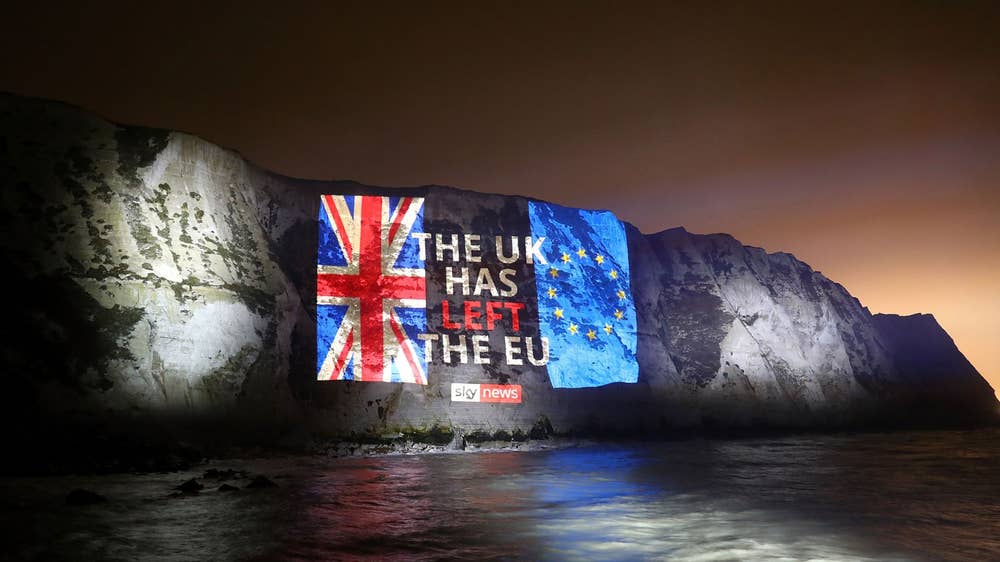
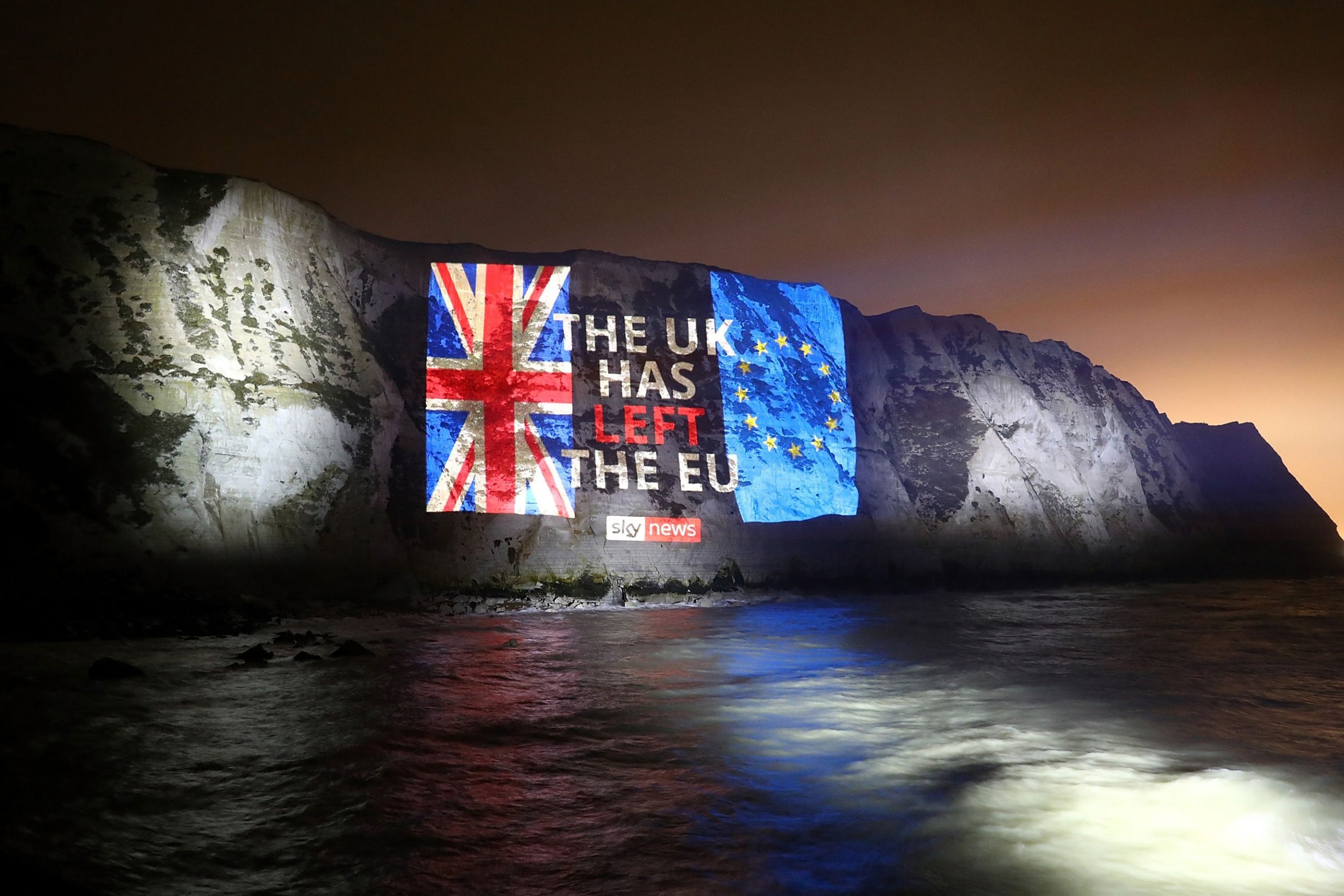
1/66
A message projected onto the White Cliffs of Dover
Sky News/AFP via Getty
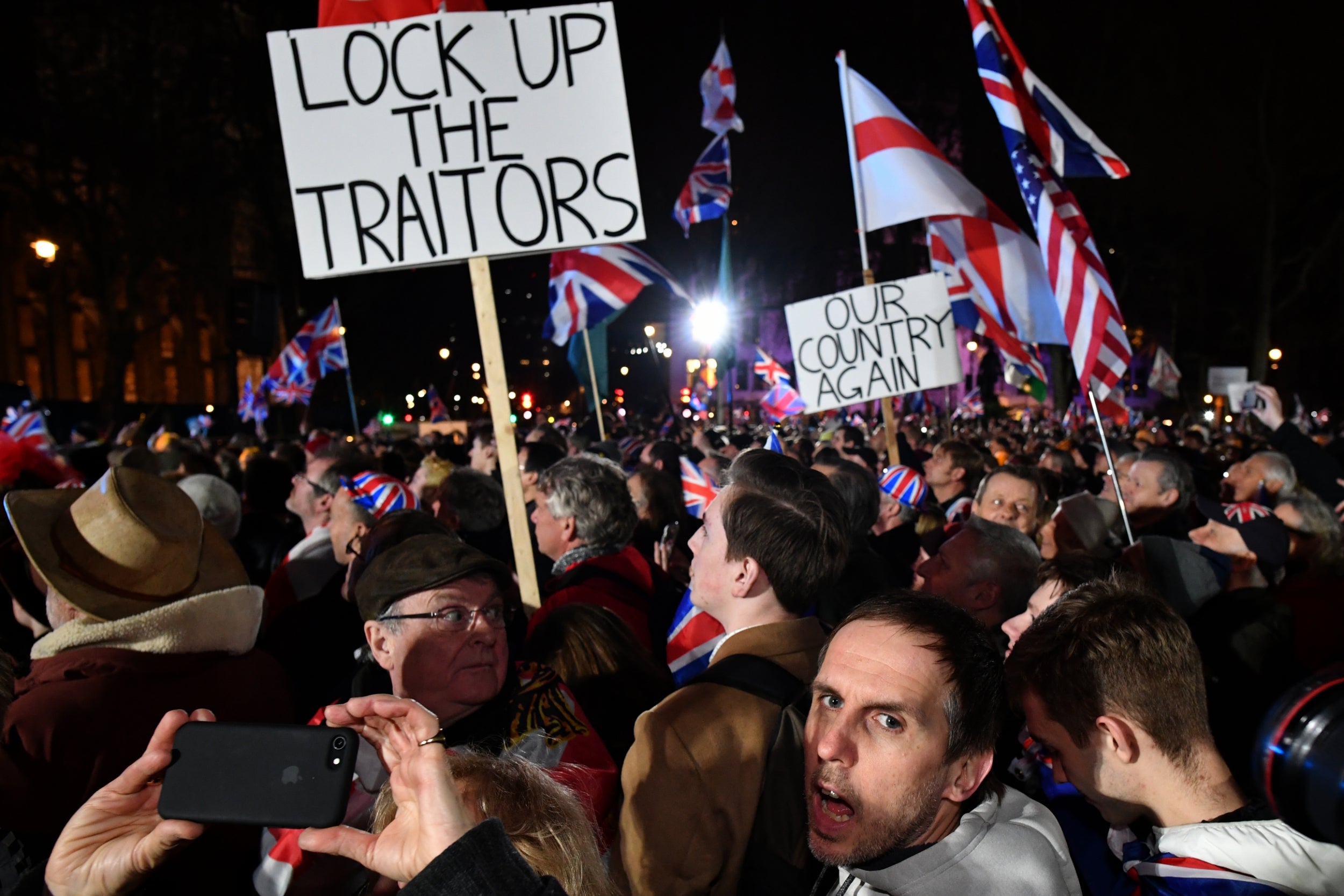
2/66
Getty
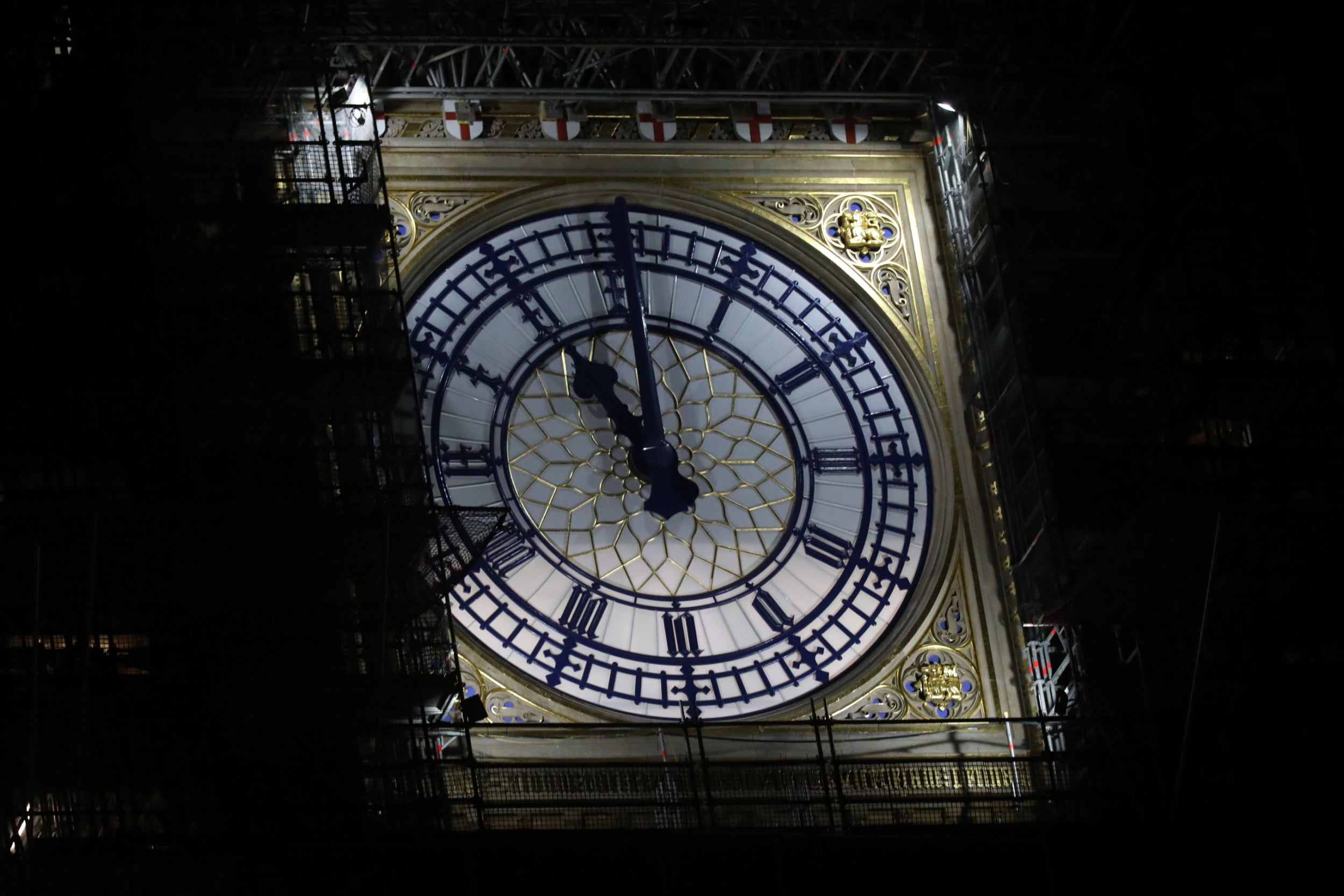
3/66
Big Ben, shows the hands at eleven o’clock at night
AFP via Getty Images
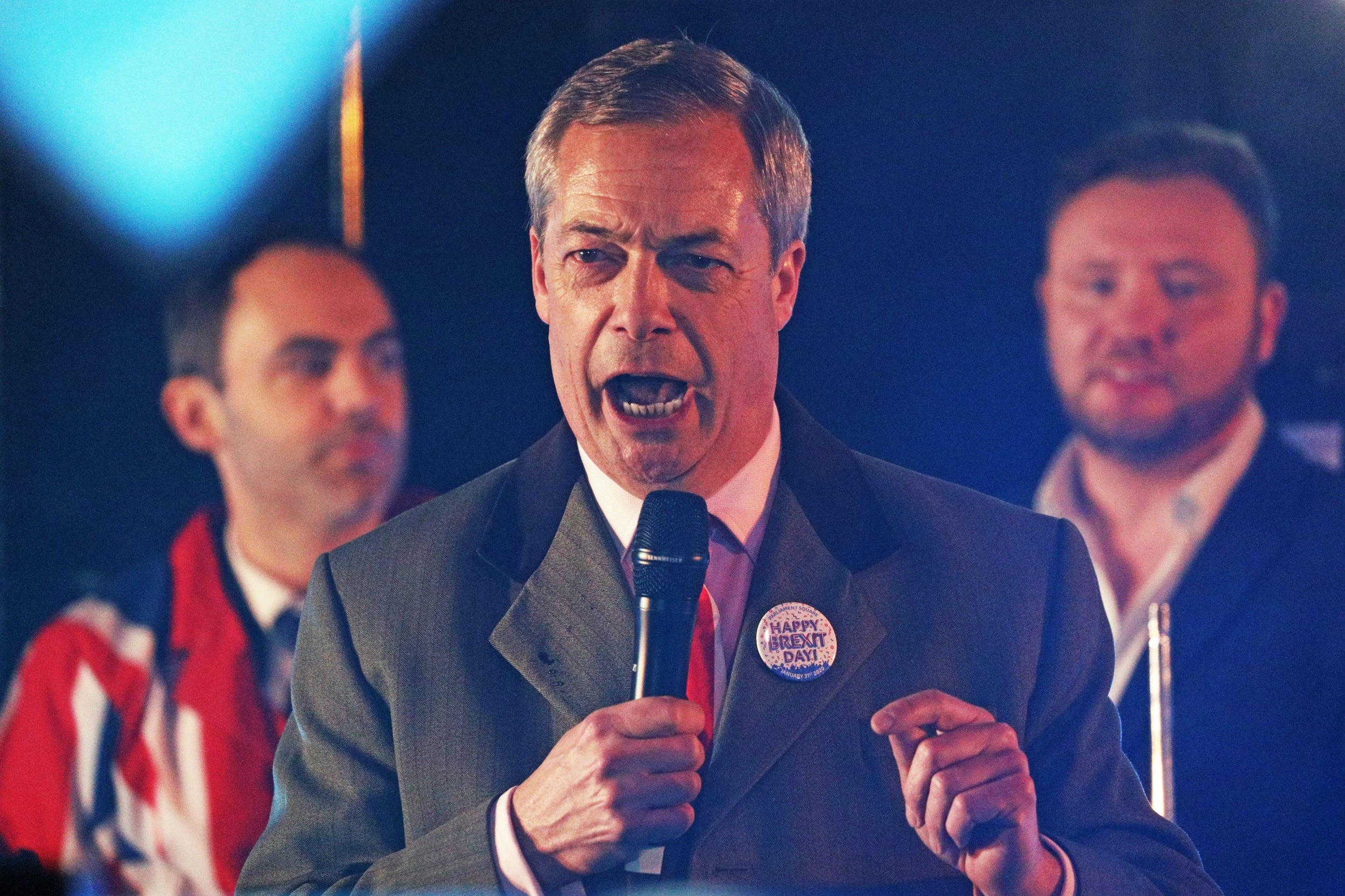
4/66
Nigel Farage speaks to pro-Brexit supporters
PA
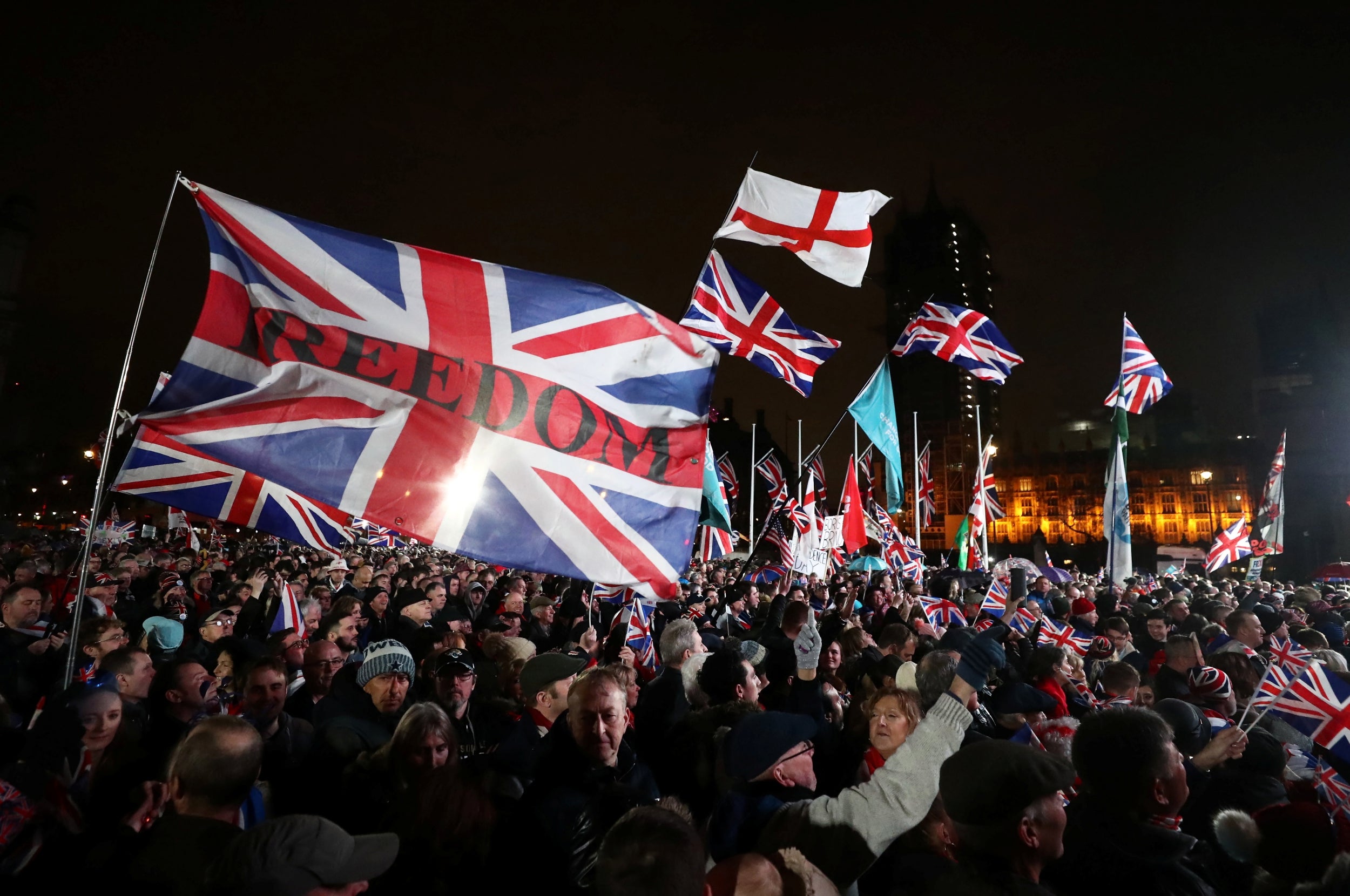
5/66
Pro-Brexit demonstrators celebrate on Parliament Square
REUTERS
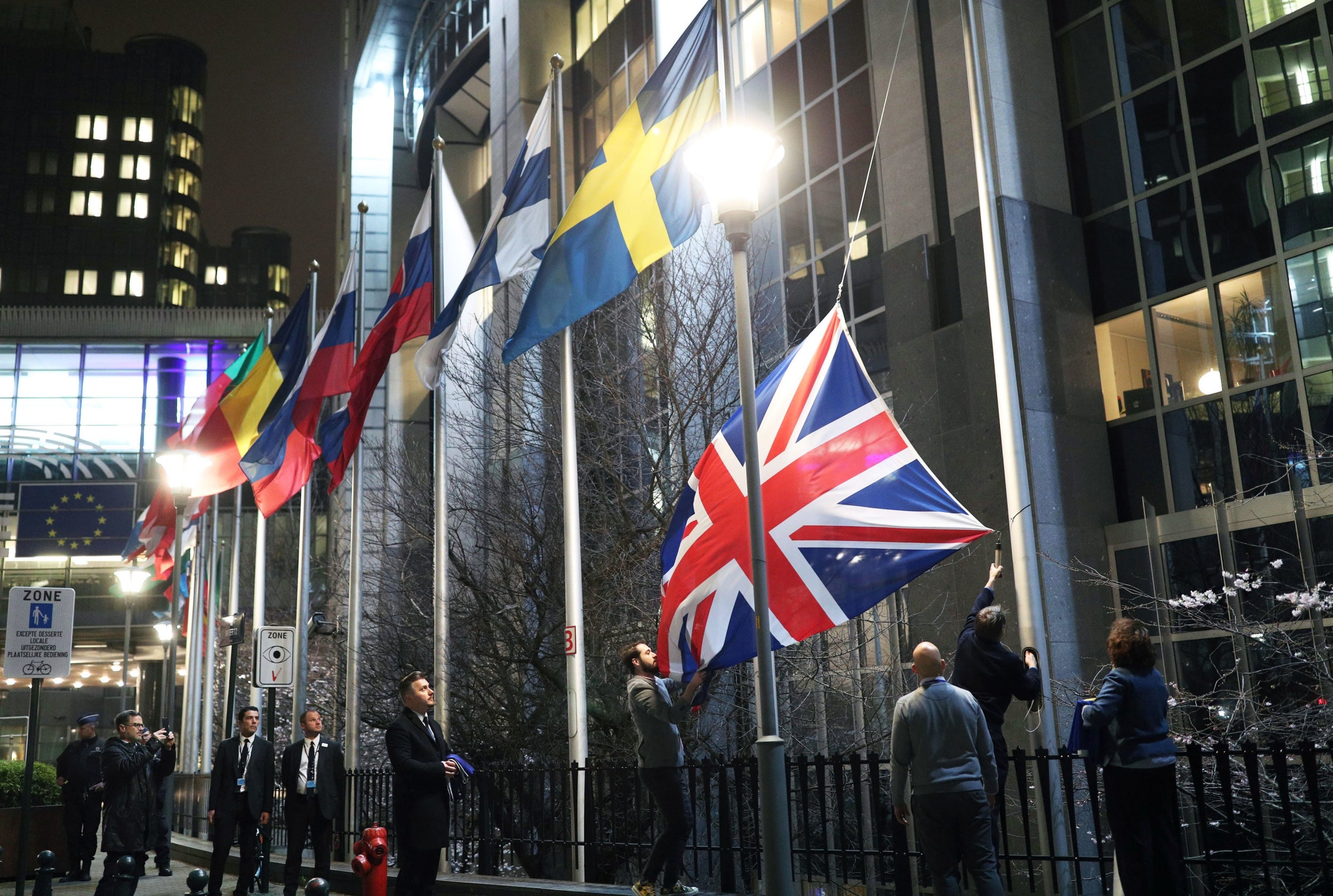
6/66
The Union flag is taken down outside the European Parliament in Brussels
PA

7/66
Pro-EU campaigners outside the Scottish Parliament, Edinburgh
PA
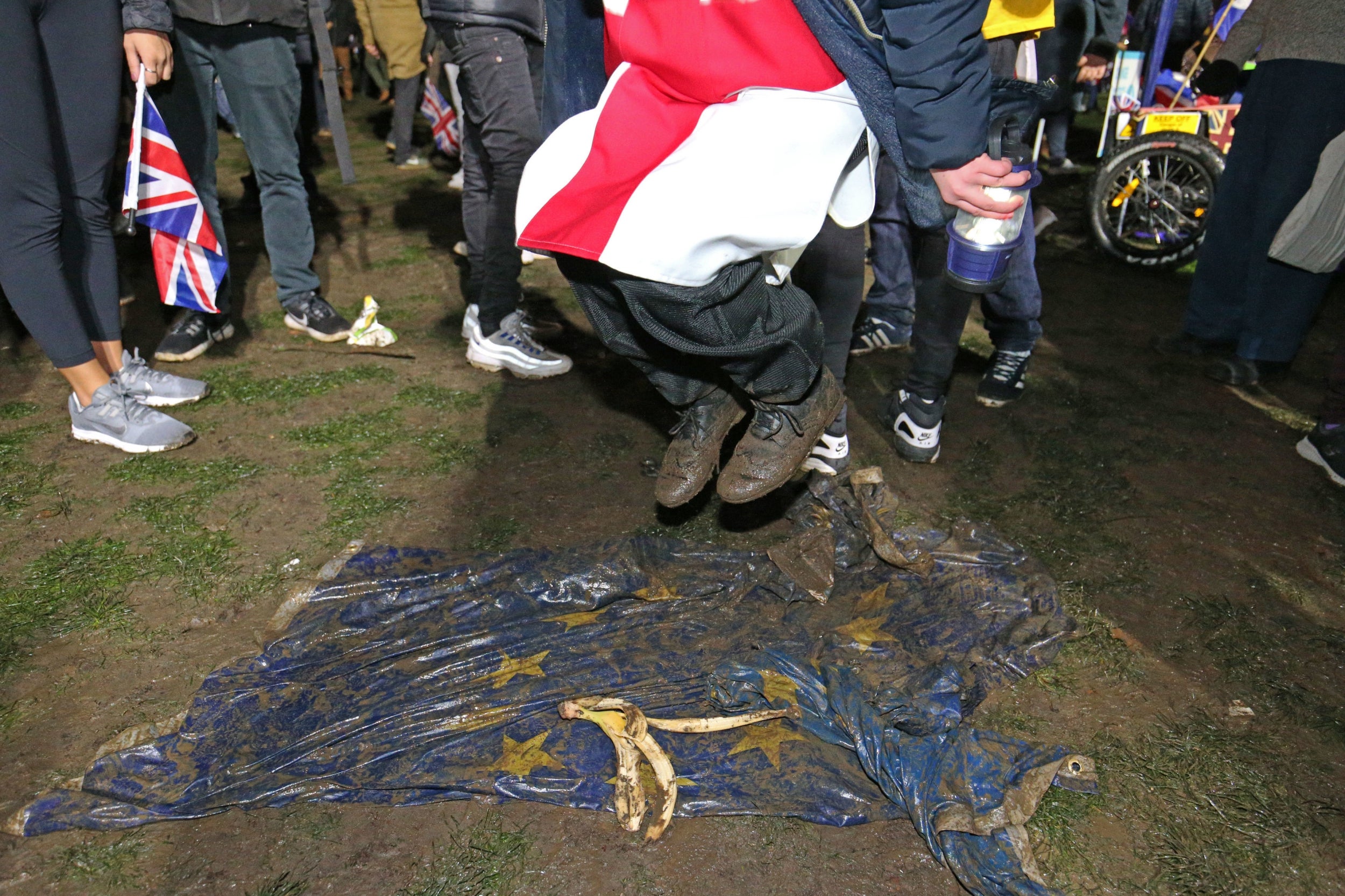
8/66
A pro-Brexit supporter jumps on an EU flag in Parliament Square
PA
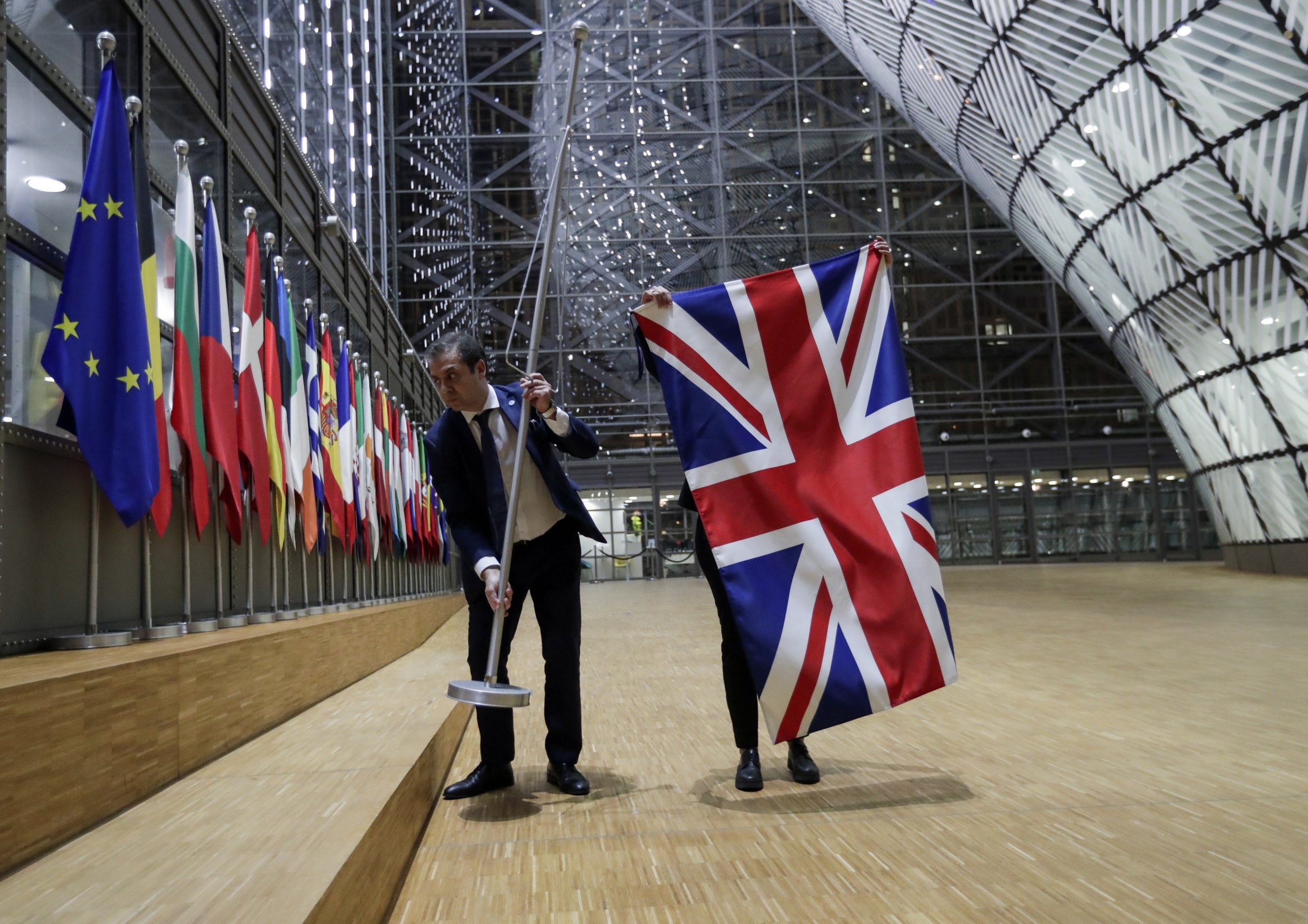
9/66
EU Council staff removed the Union Jack-British flag from the European Council in Brussels, Belgium
EPA
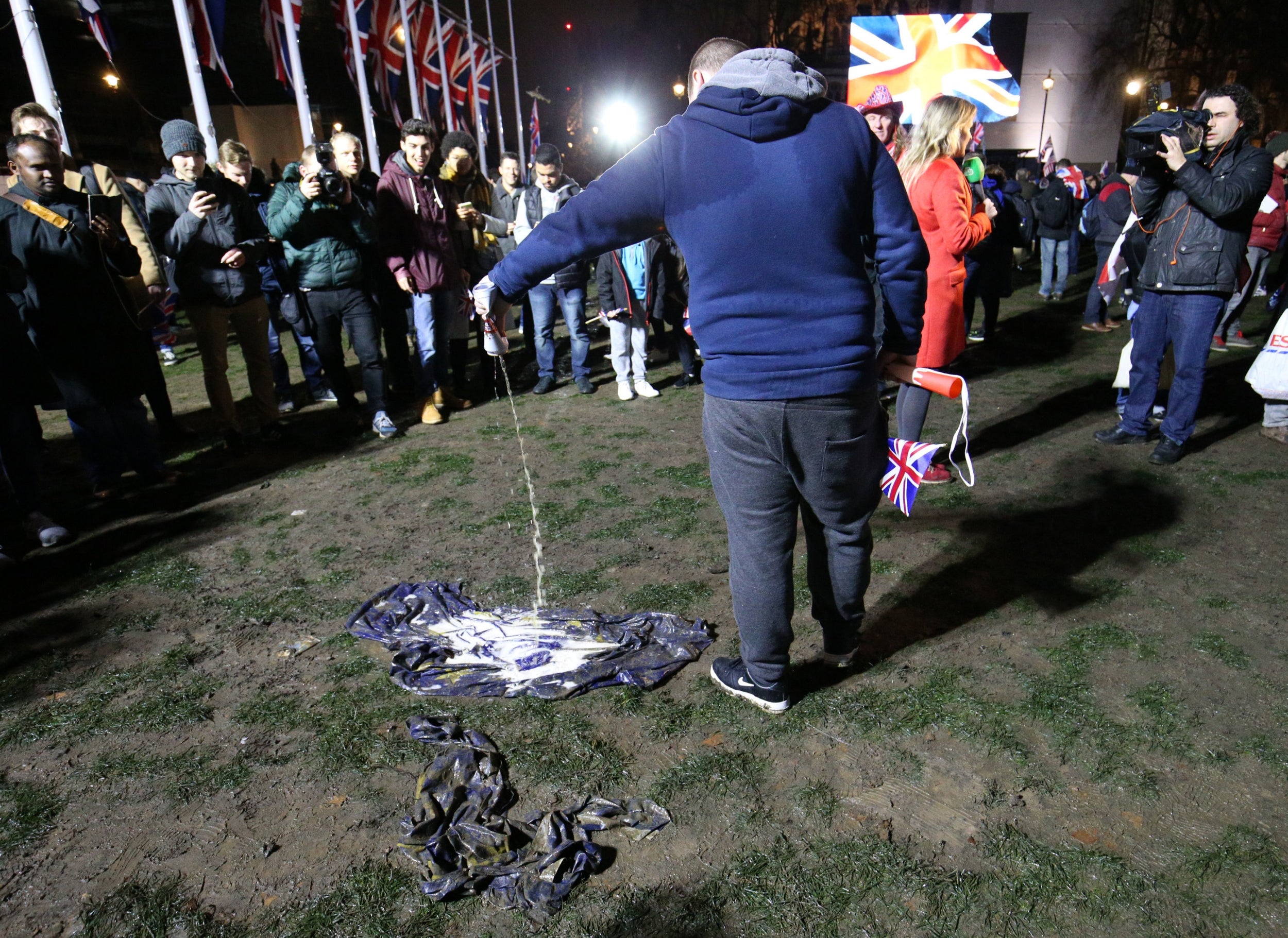
10/66
A pro-Brexit supporter pours beer onto an EU flag
PA
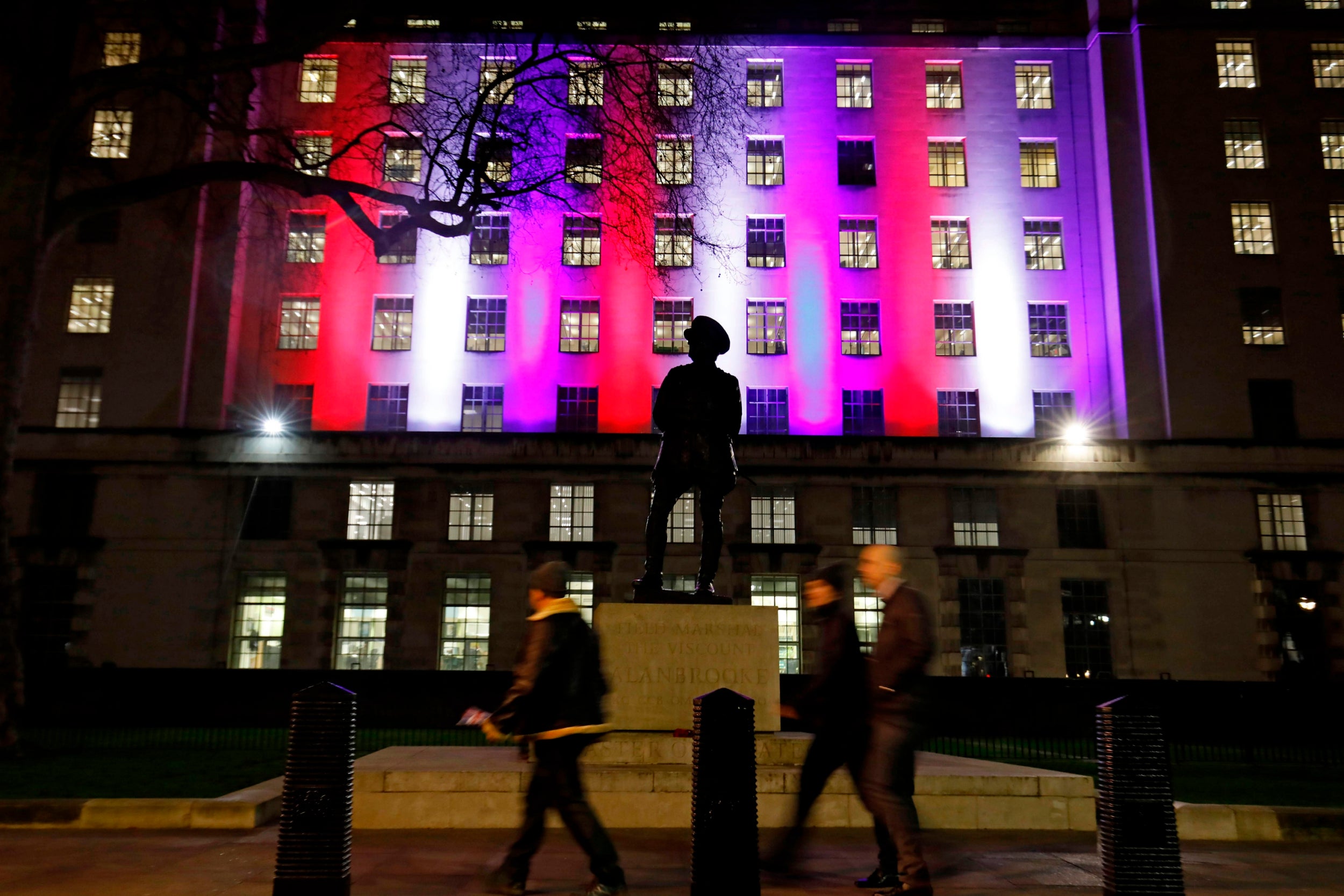
11/66
Pedestrians pass in front of the Ministry of Defence Building on Whitehall, illuminated by red, white and blue lights in central London
AFP via Getty Images
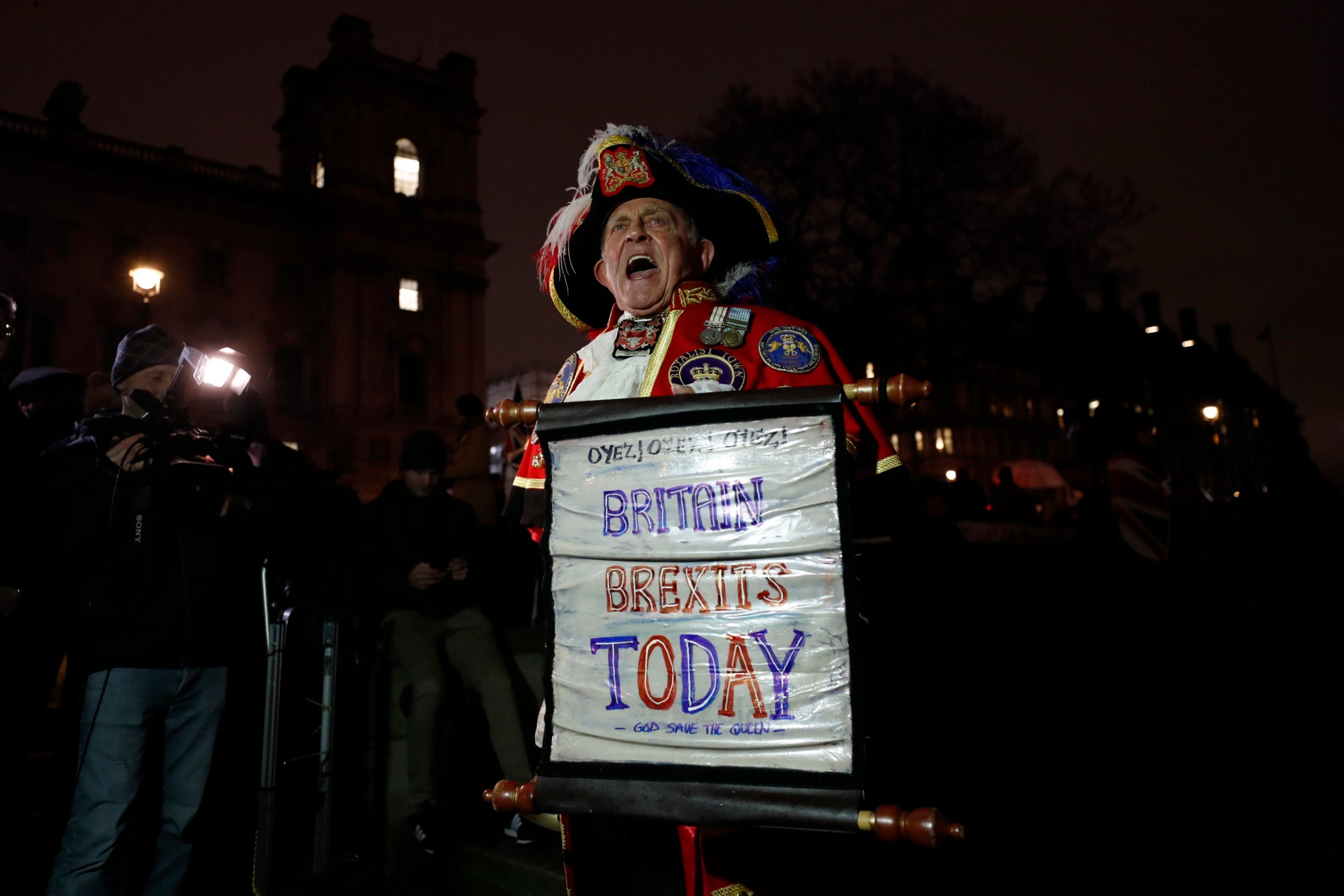
12/66
A Brexit supporter shouts during a rally in London
AP
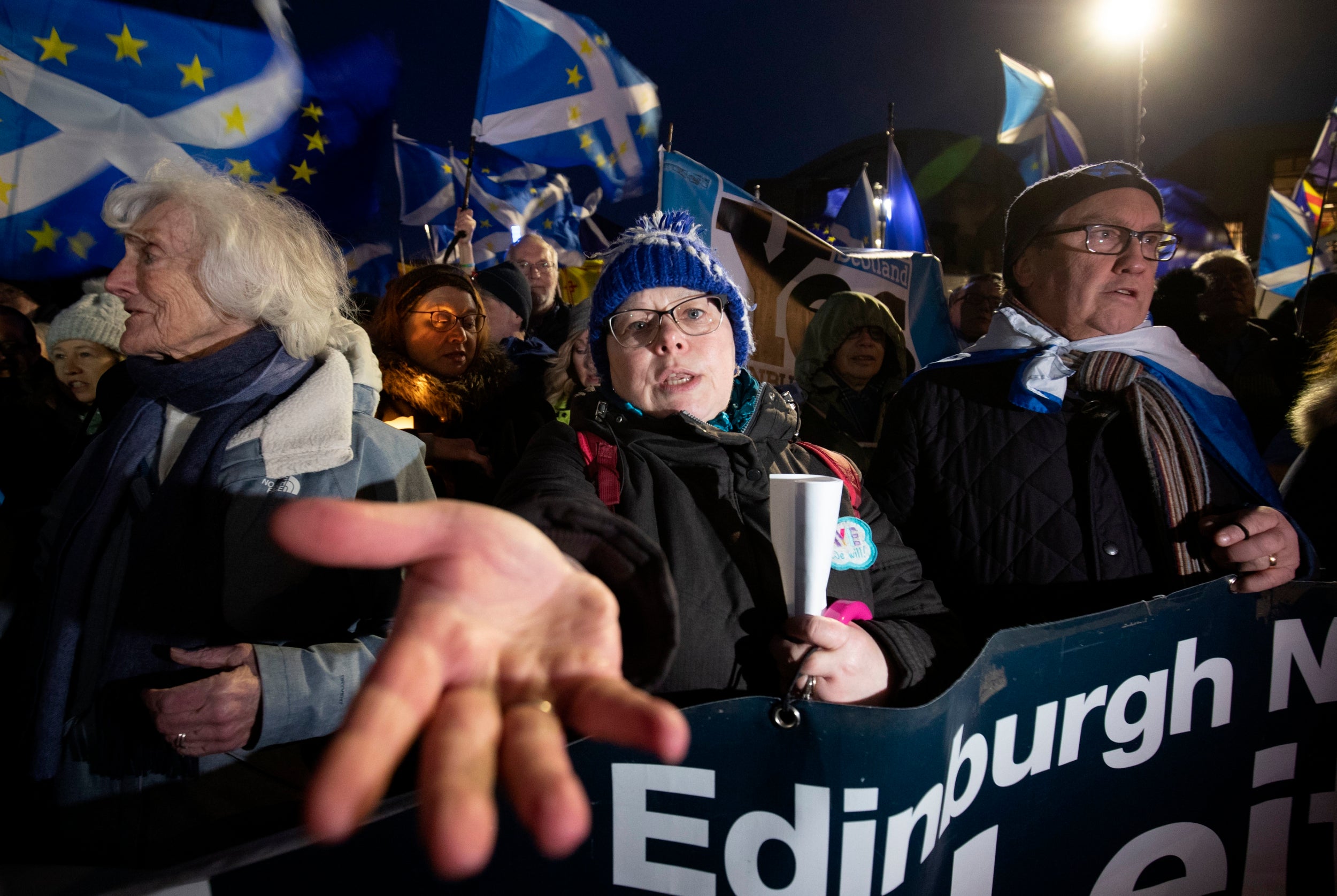
13/66
Pro-EU campaigners outside the Scottish Parliament, Edinburgh
PA
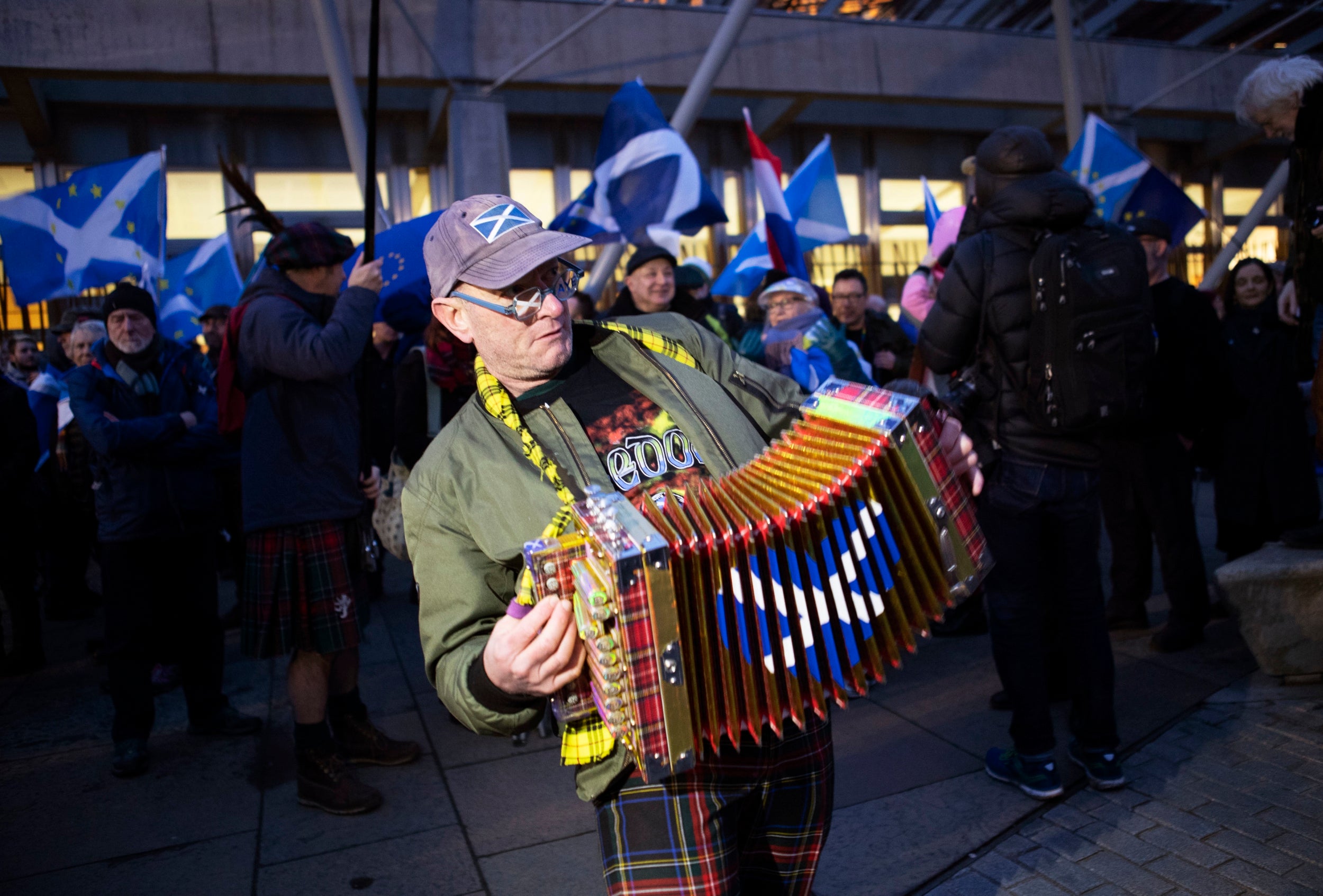
14/66
Pro-EU campaigners take part in a ‘Missing EU Already’ rally outside the Scottish Parliament, Edinburgh
PA
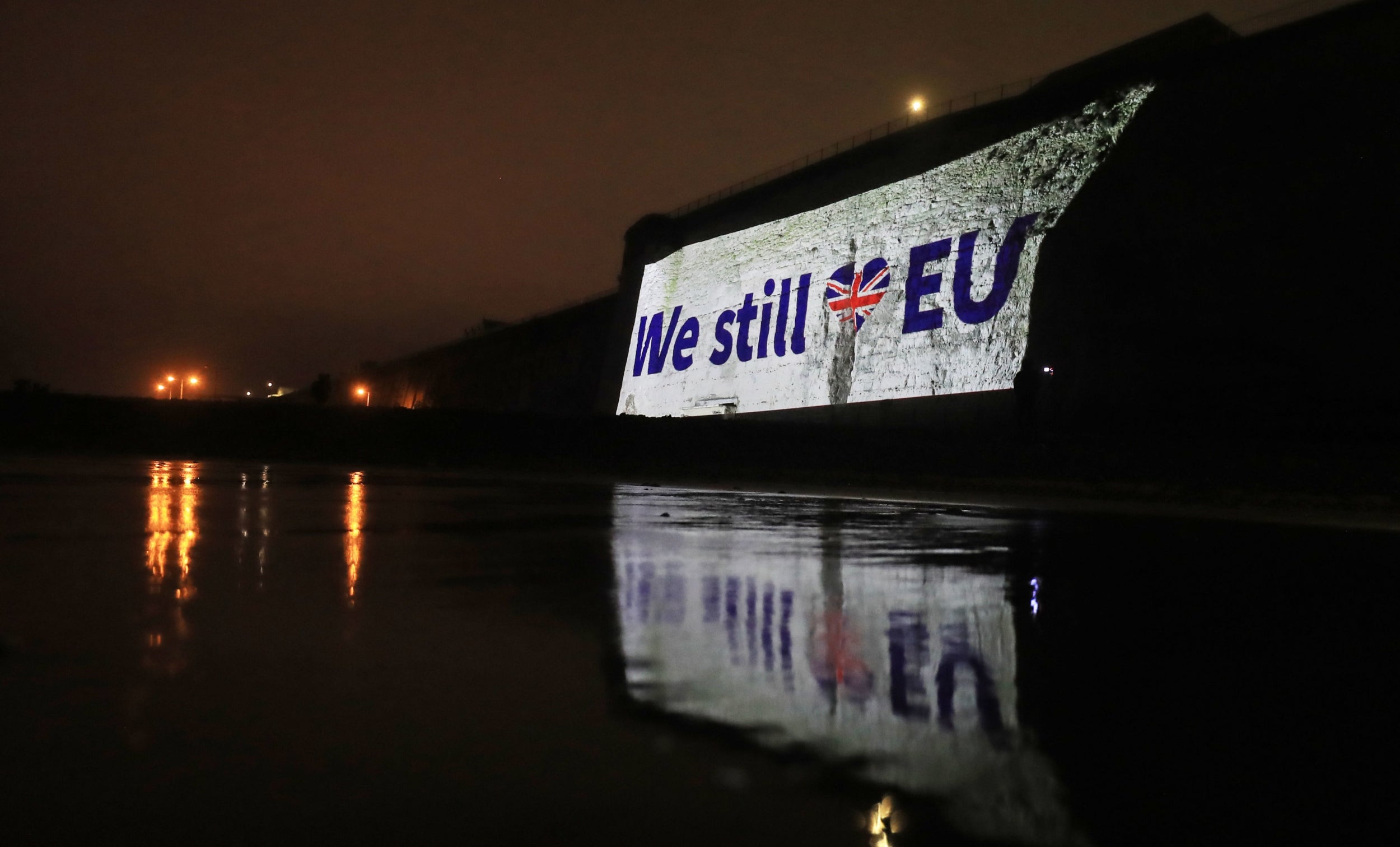
15/66
A large pro-EU banner is projected onto Ramsgate cliff in Kent
PA

16/66
Pro-EU supporters light candles in Smith Square in Westminster
PA

17/66
A man waves Union flags from a small car as he drives past Brexit supporters gathering in Parliament Square
AFP via Getty Images
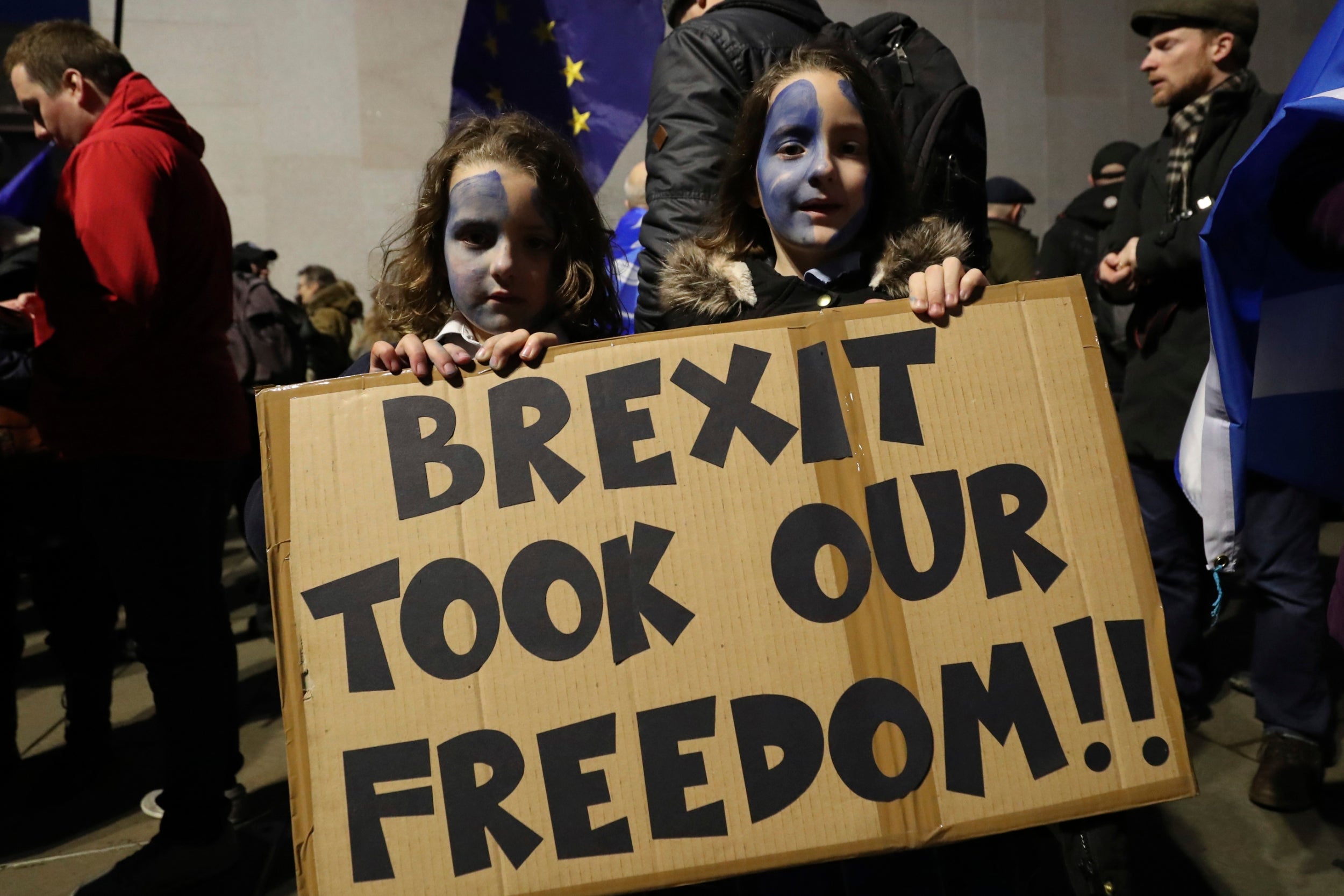
18/66
The five-year old Elisa Saemann, left, and her seven-year old sister Katie hold a placard during a rally by anti-Brexit protesters outside the Scottish parliament in Edinburgh
AP
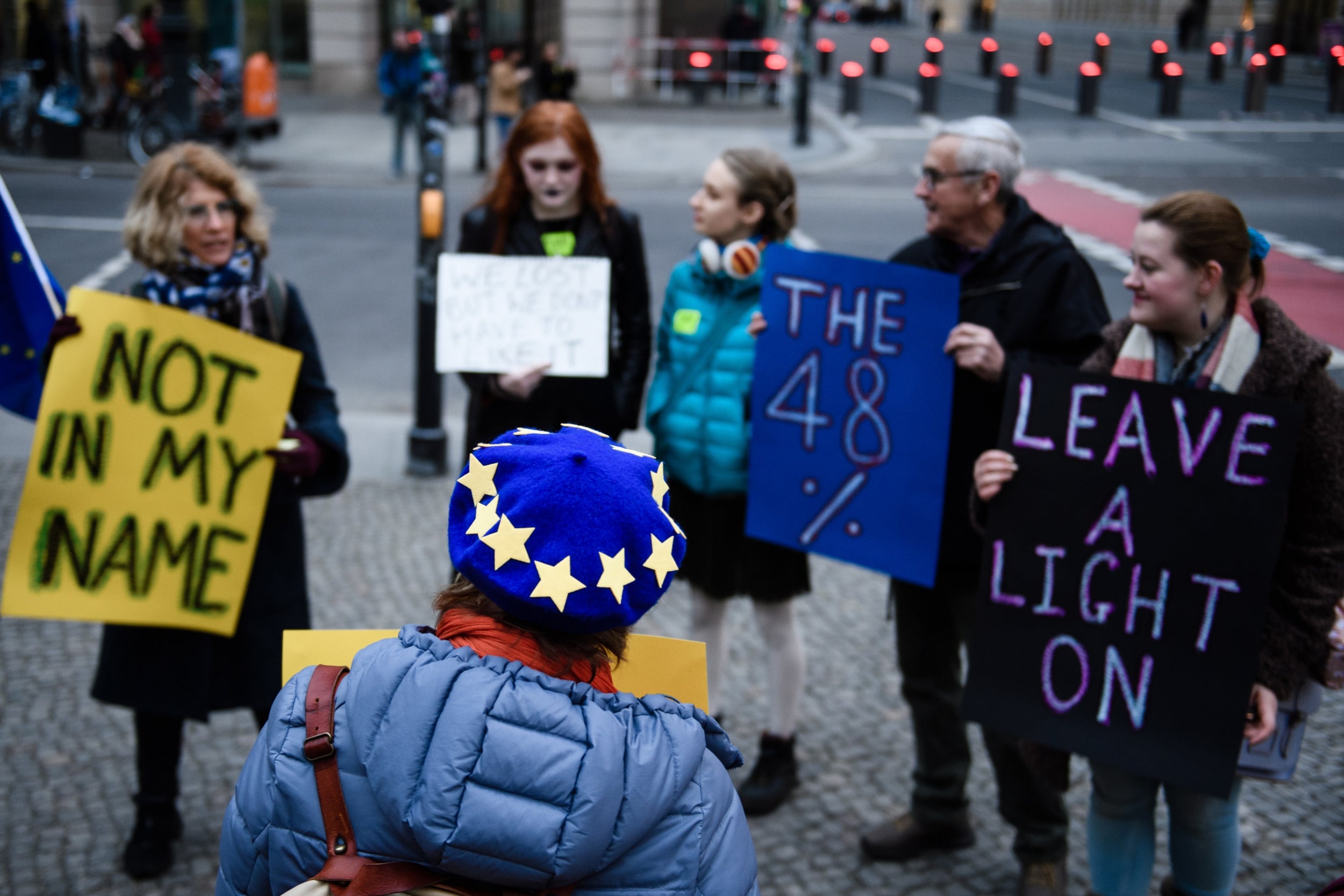
19/66
Pro Europe supporters gather on Brexit day near the British embassy in Berlin, Germany
EPA

20/66
Anti-Brexit protester hugs a man while holding a placard
REUTERS
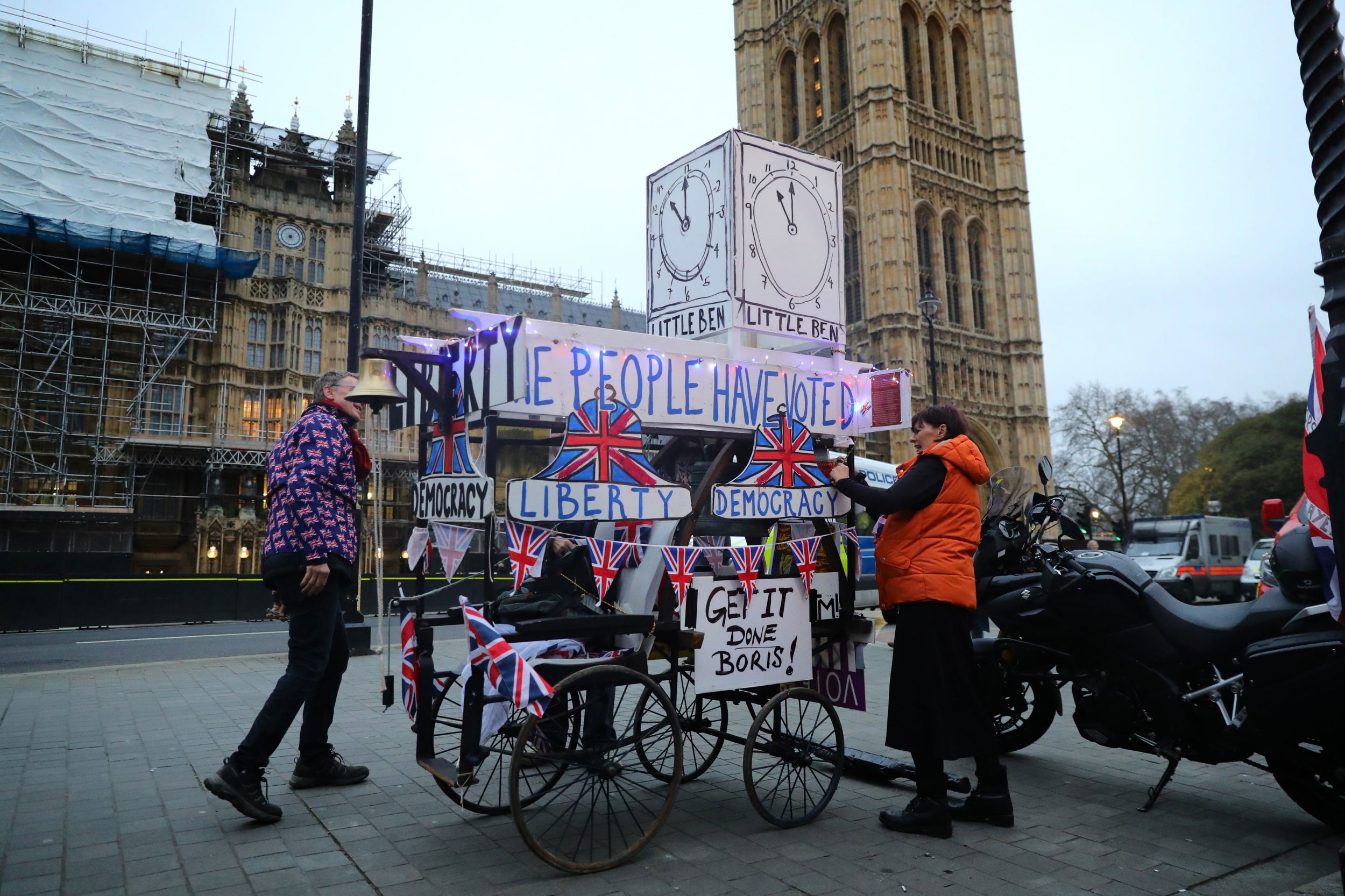
21/66
A decorated, old fashioned fire pump in Parliament Square
PA

22/66
Pro Brexit Elvis impersonator performs at Parliament Square
Getty Images
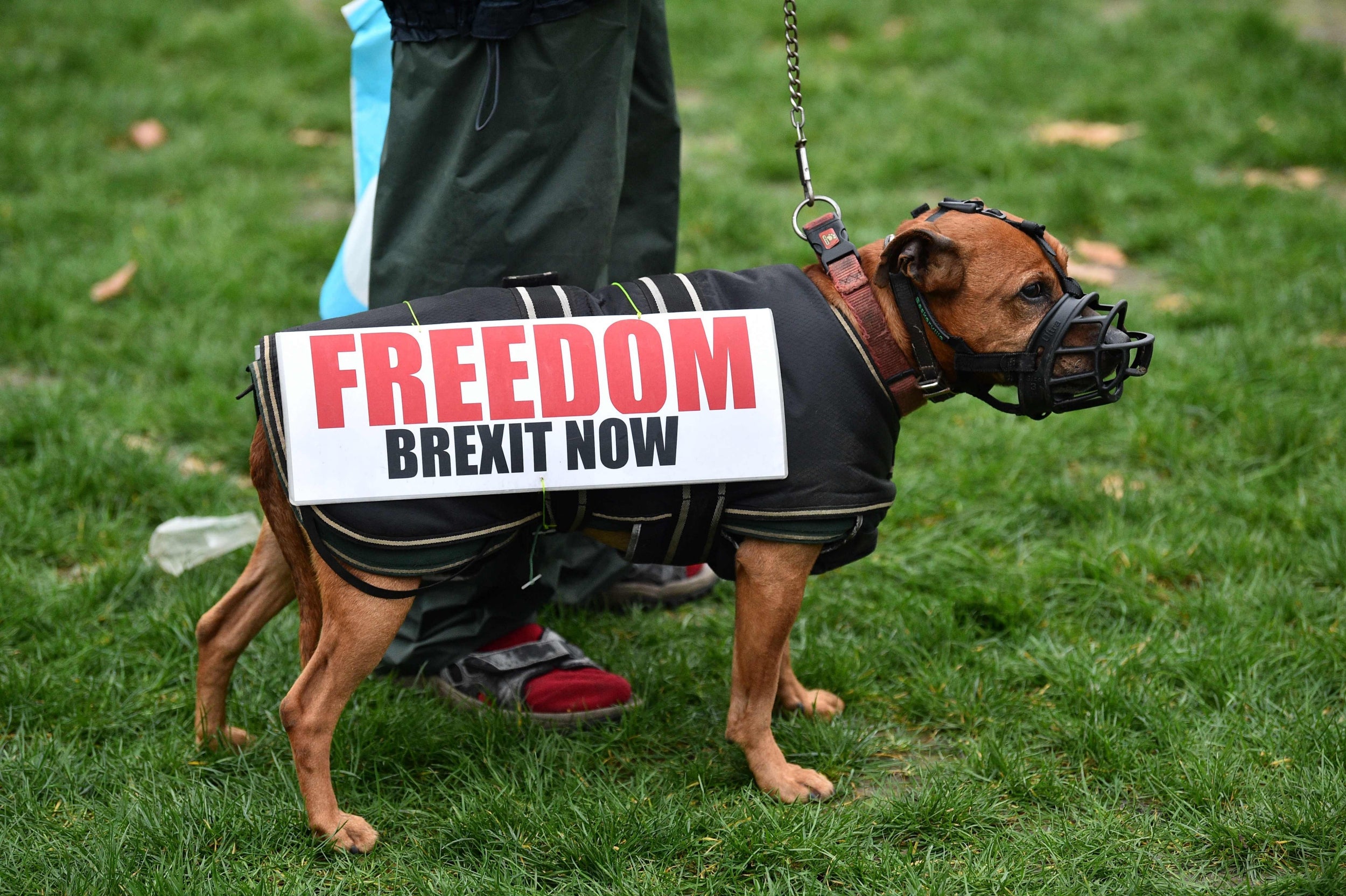
23/66
An anti-Brexiteers stands with his dog in Parliament Square
AFP via Getty Images
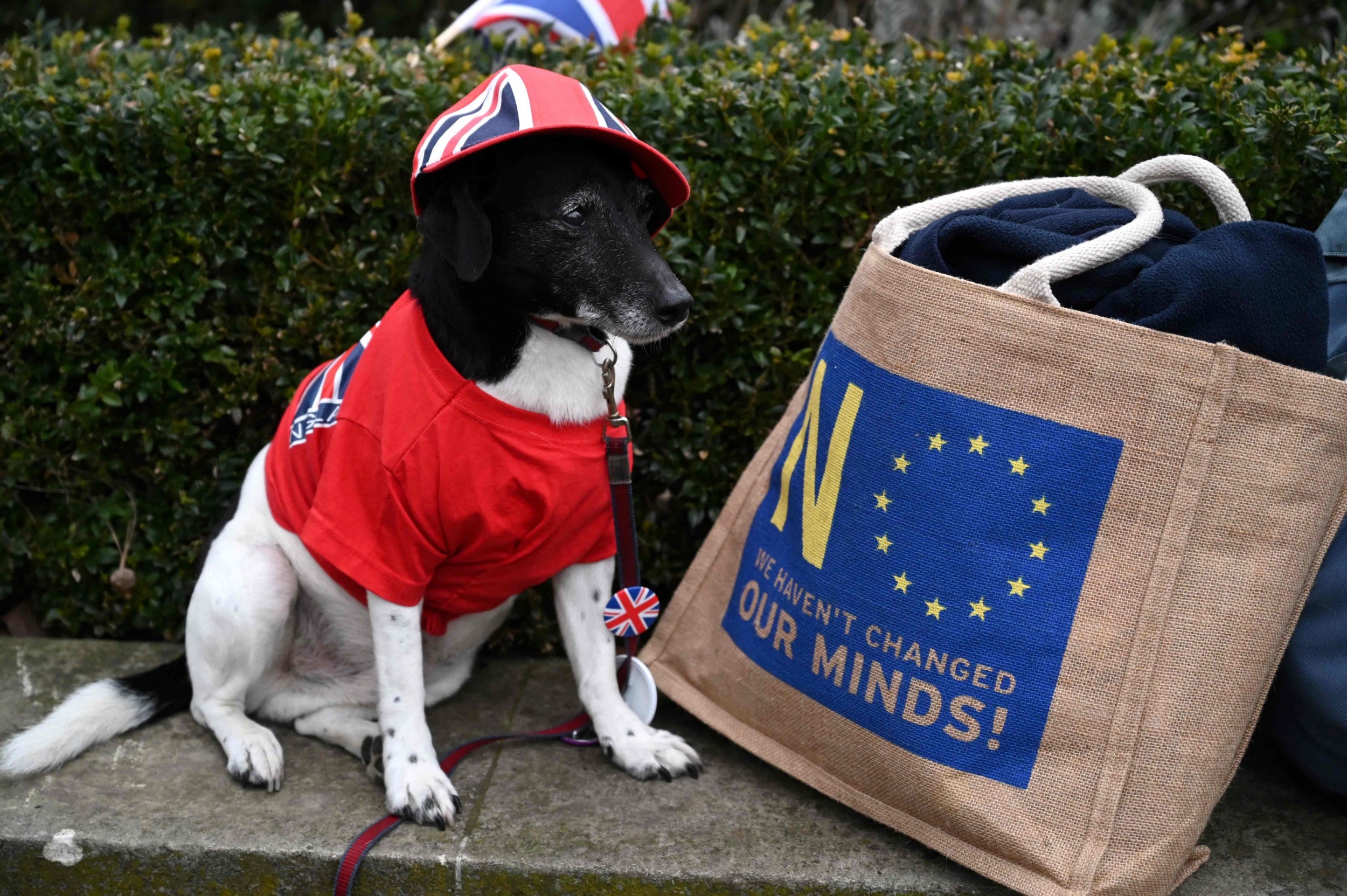
24/66
Paddy from Bournemouth wears Union colours as he sits next to an EU flag decorated bag in Parliament Square
AFP via Getty Images
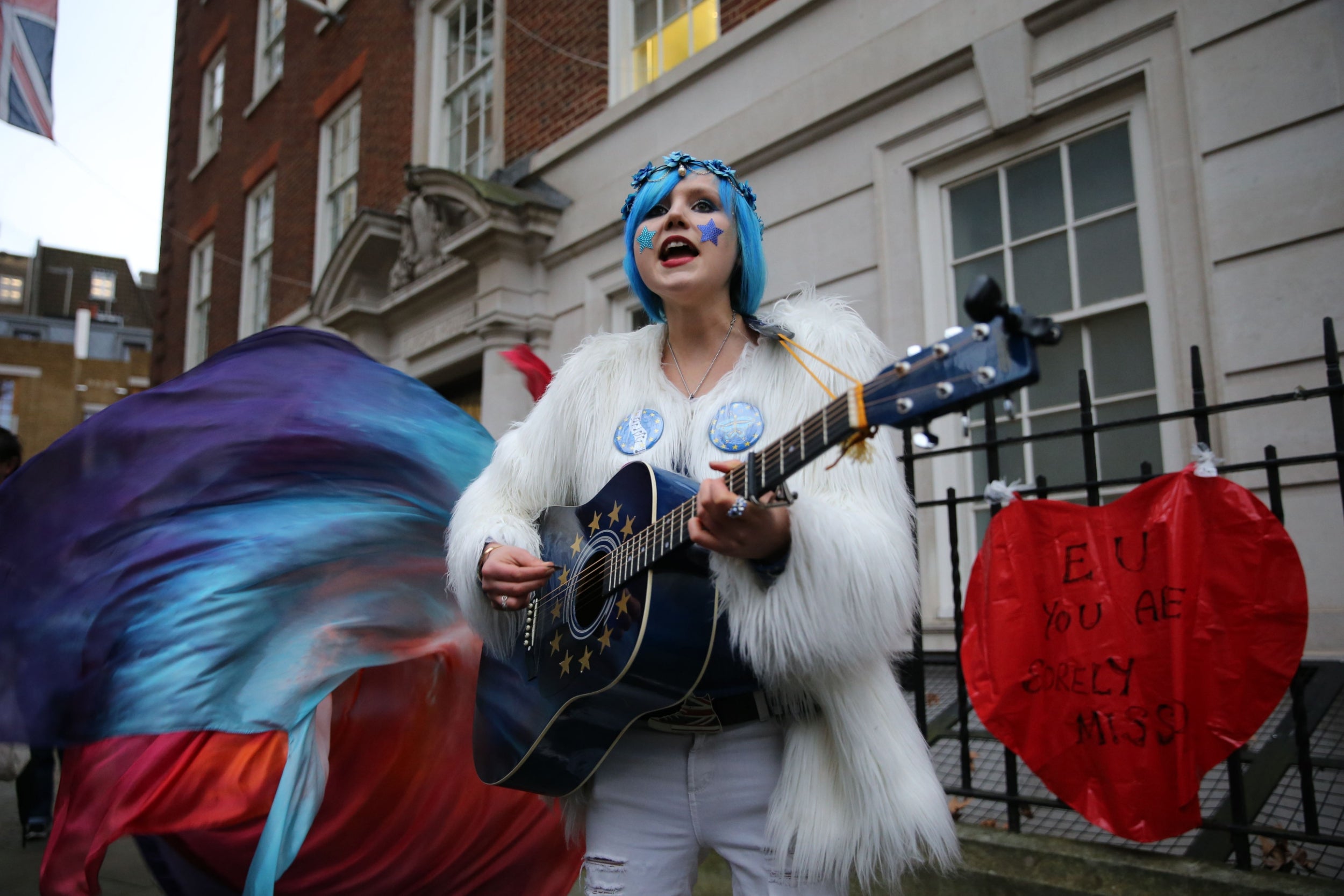
25/66
A pro-EU activist plays a guitar decorated with the EU flag during a protest organised by civil rights group New Europeans outside Europe House, central London
AFP via Getty Images
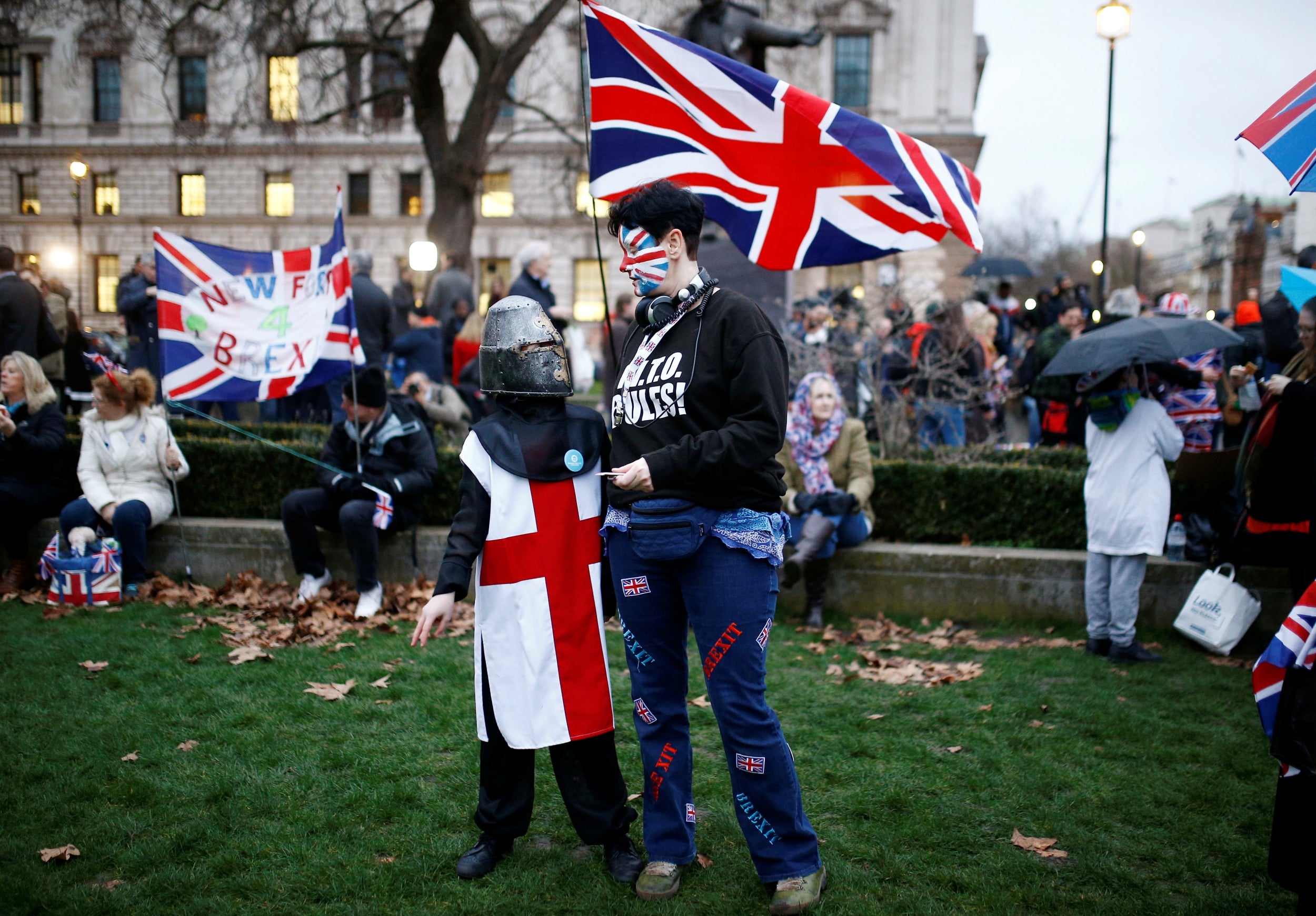
26/66
People celebrate Britain leaving the EU
REUTERS
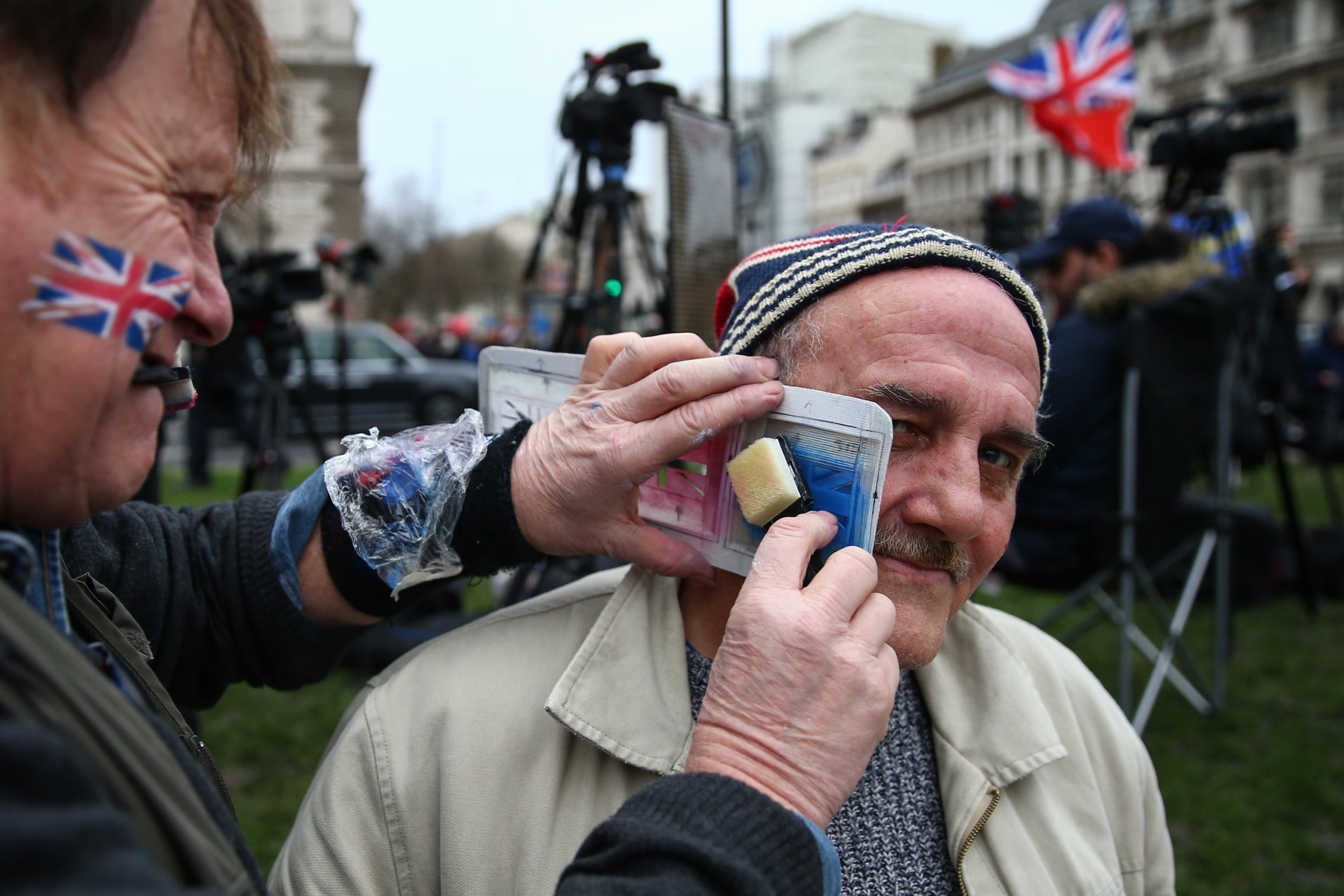
27/66
A Pro Brexit supporter has a Union Jack painted onto his face at Parliament Square
Getty Images
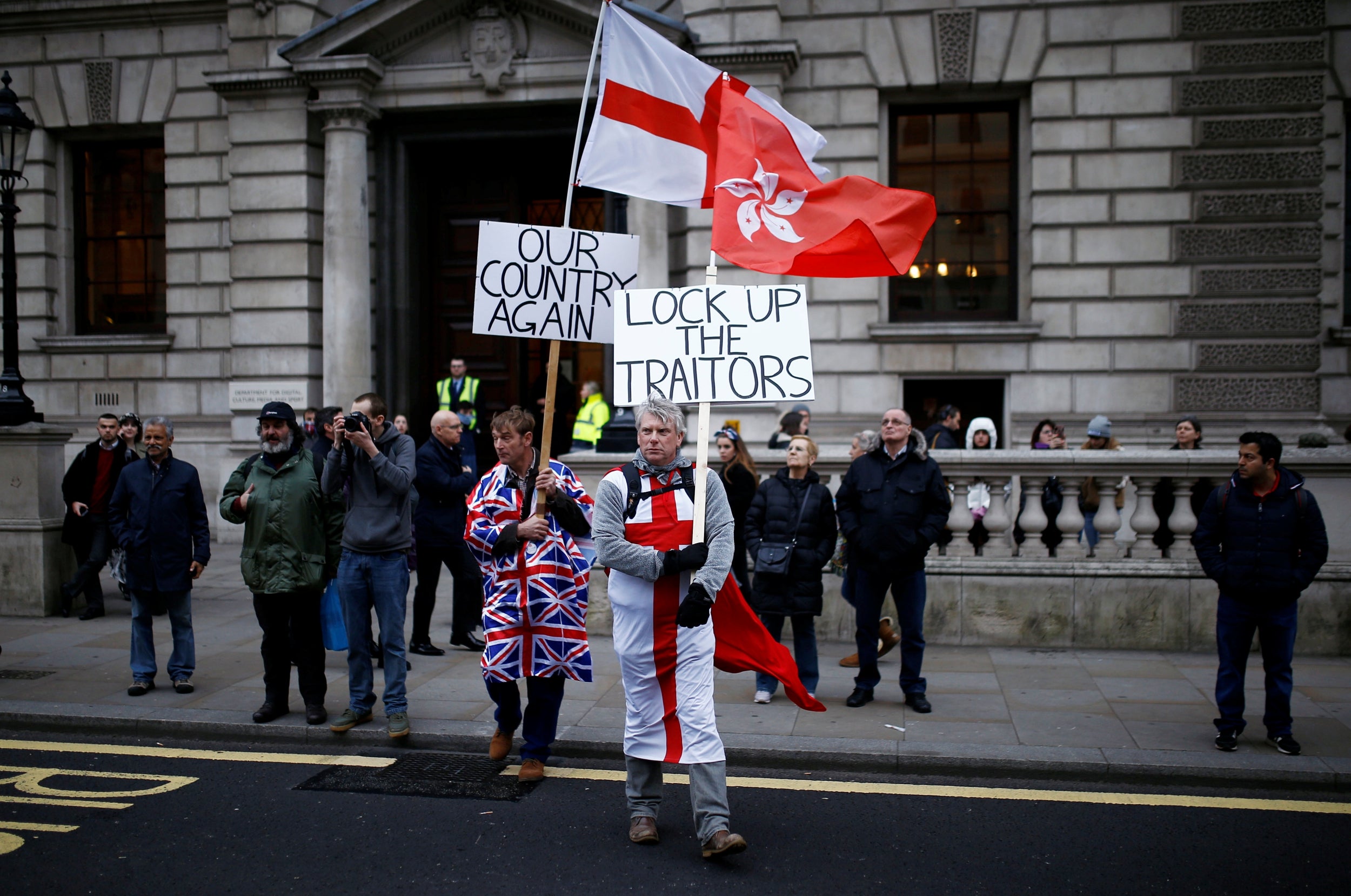
28/66
Men hold placards celebrating Britain leaving the EU
REUTERS

29/66
Pro Brexit supporters dance in the street draped with Union Jack flags at Parliament Square
Getty Images
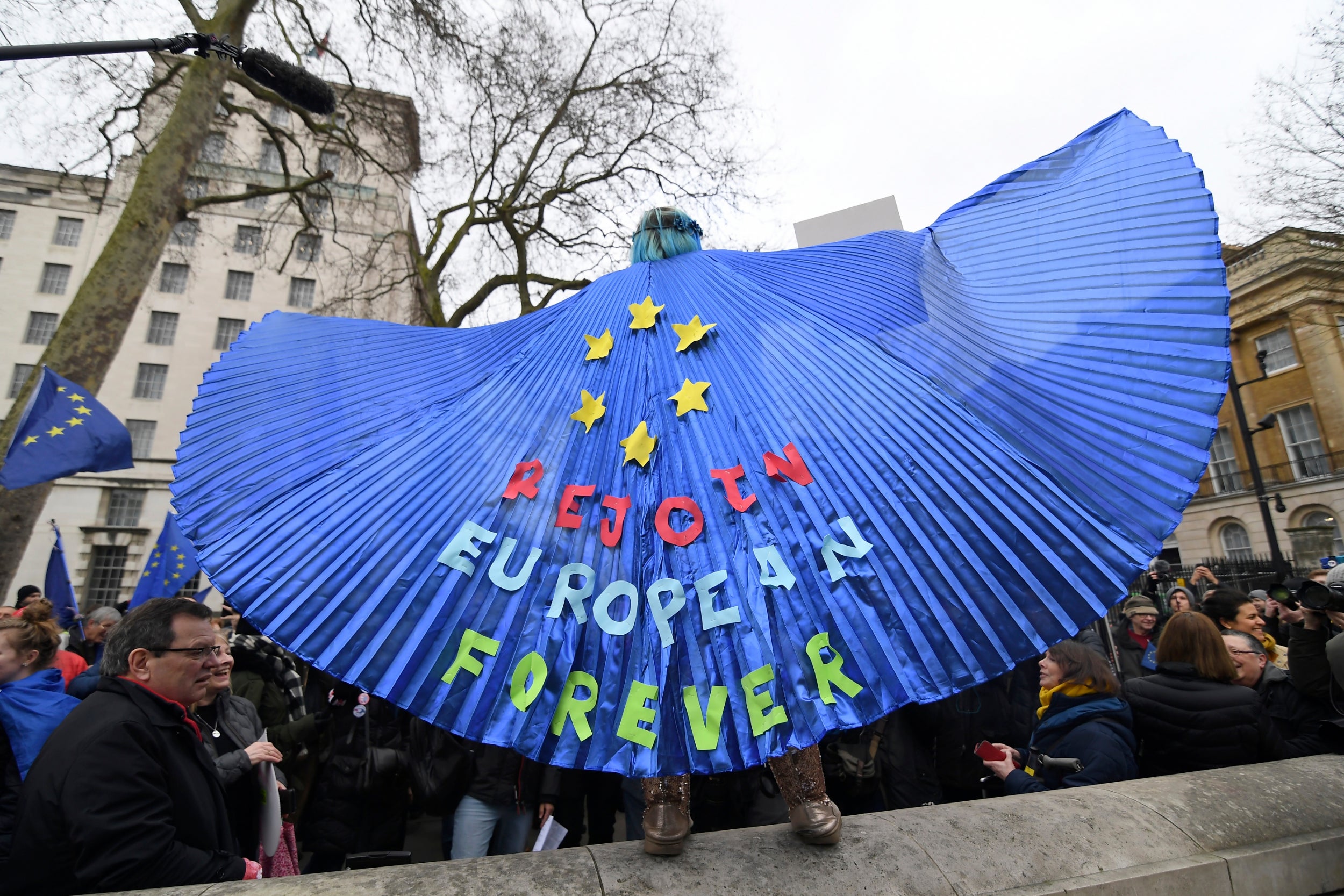
30/66
An anti-Brexit demonstrator spreads his wings during a gathering near Downing Street
AP

31/66
Pro EU supporters display a banner ‘ Here to Stay, Here to Fight, Migrants In, Tories Out’ from Westminster bridge
EPA
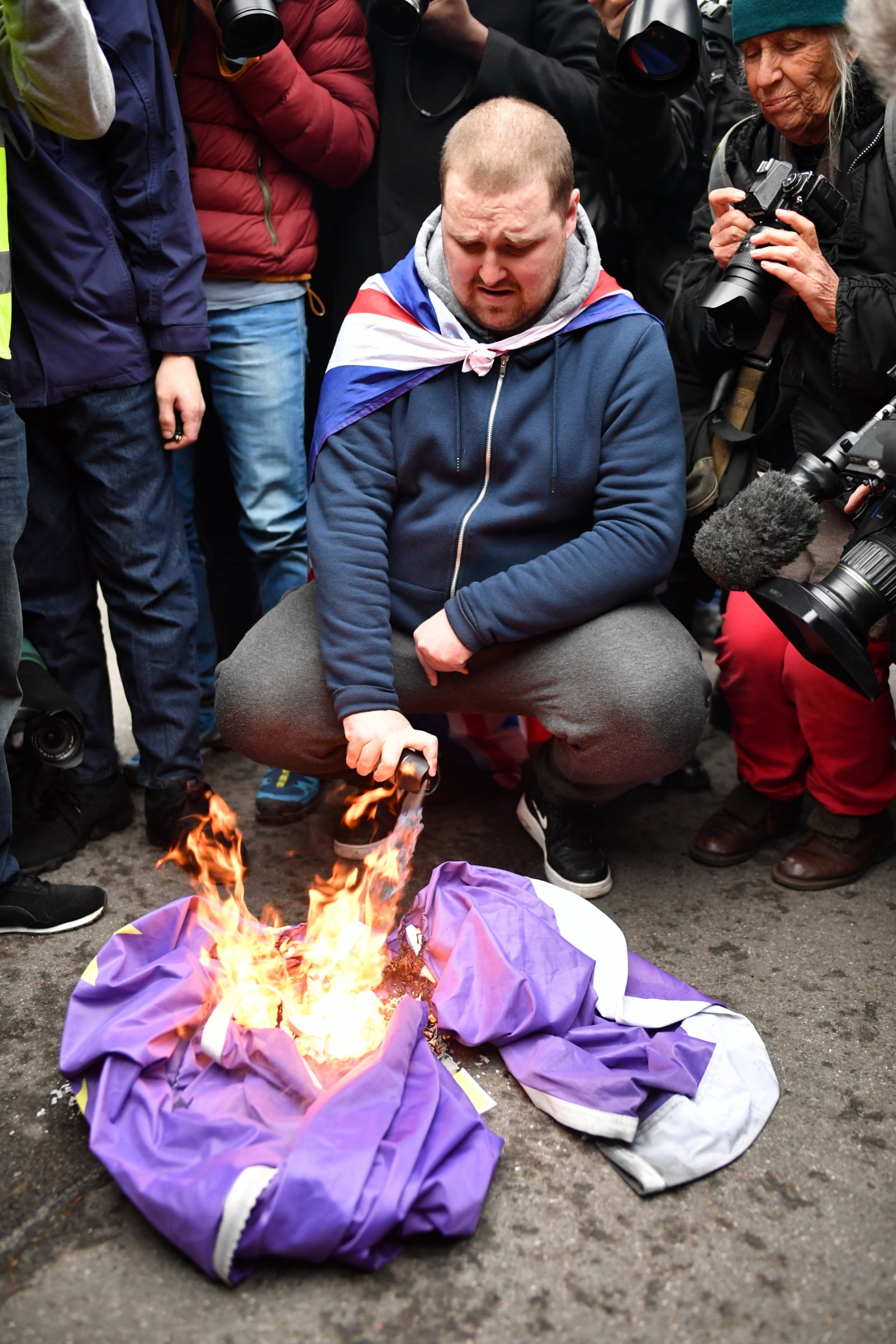
32/66
Pro-Brexit supporters burn European Union flags at Parliament Square
Getty
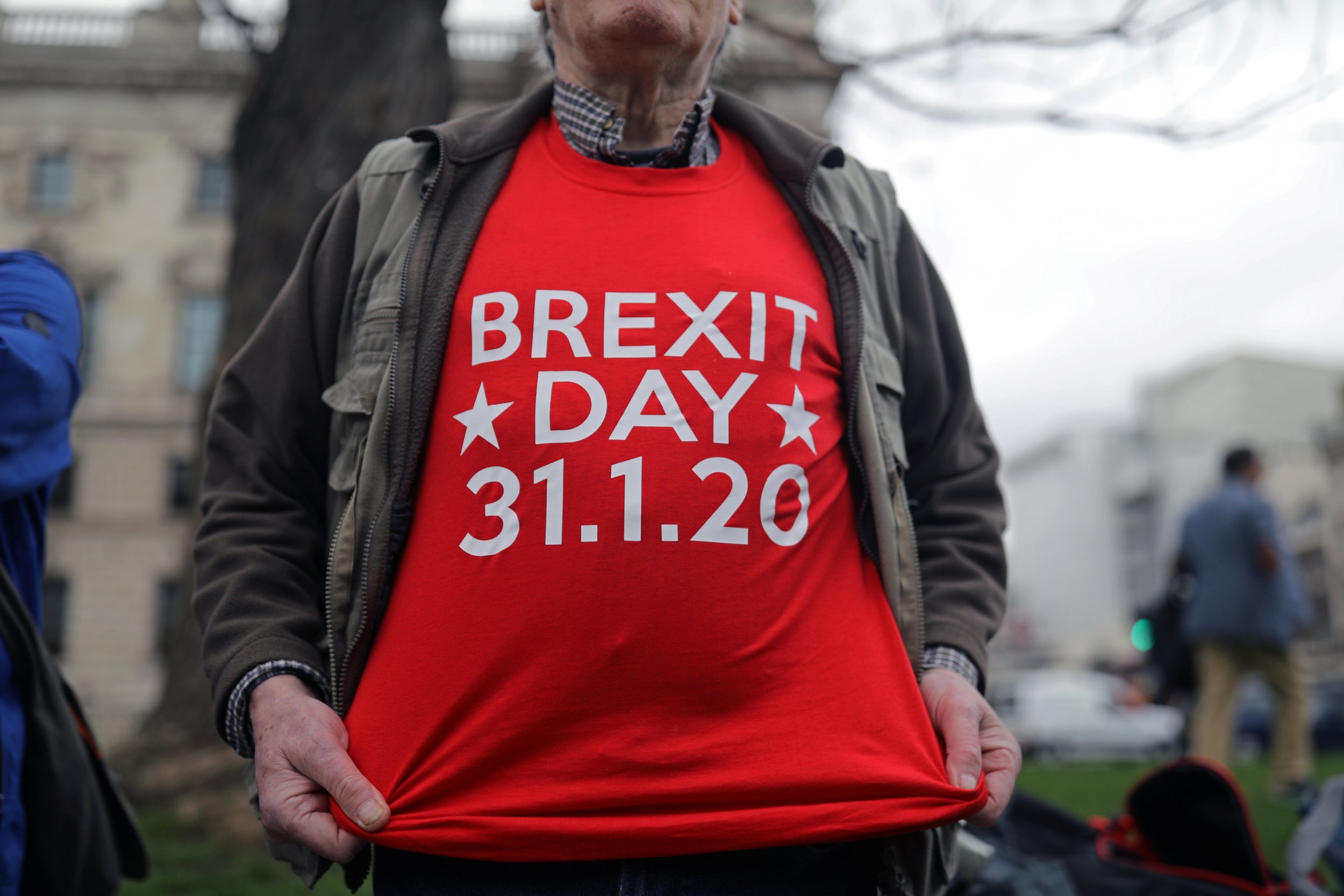
33/66
A man poses for a picture on Parliament Square in a ‘Brexit Day’ t-shirt
Reuters
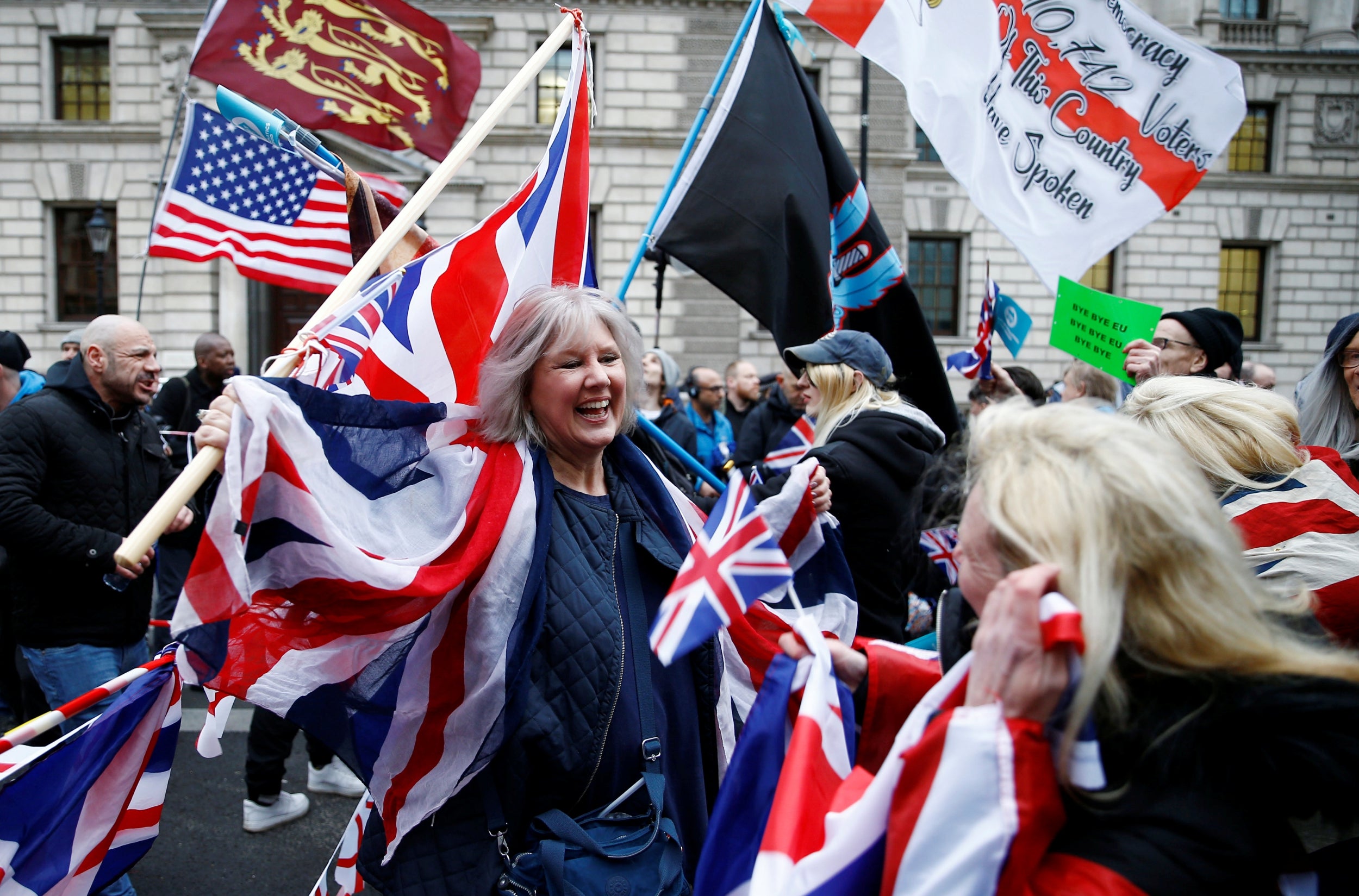
34/66
People celebrate Britain leaving the EU
Reuters
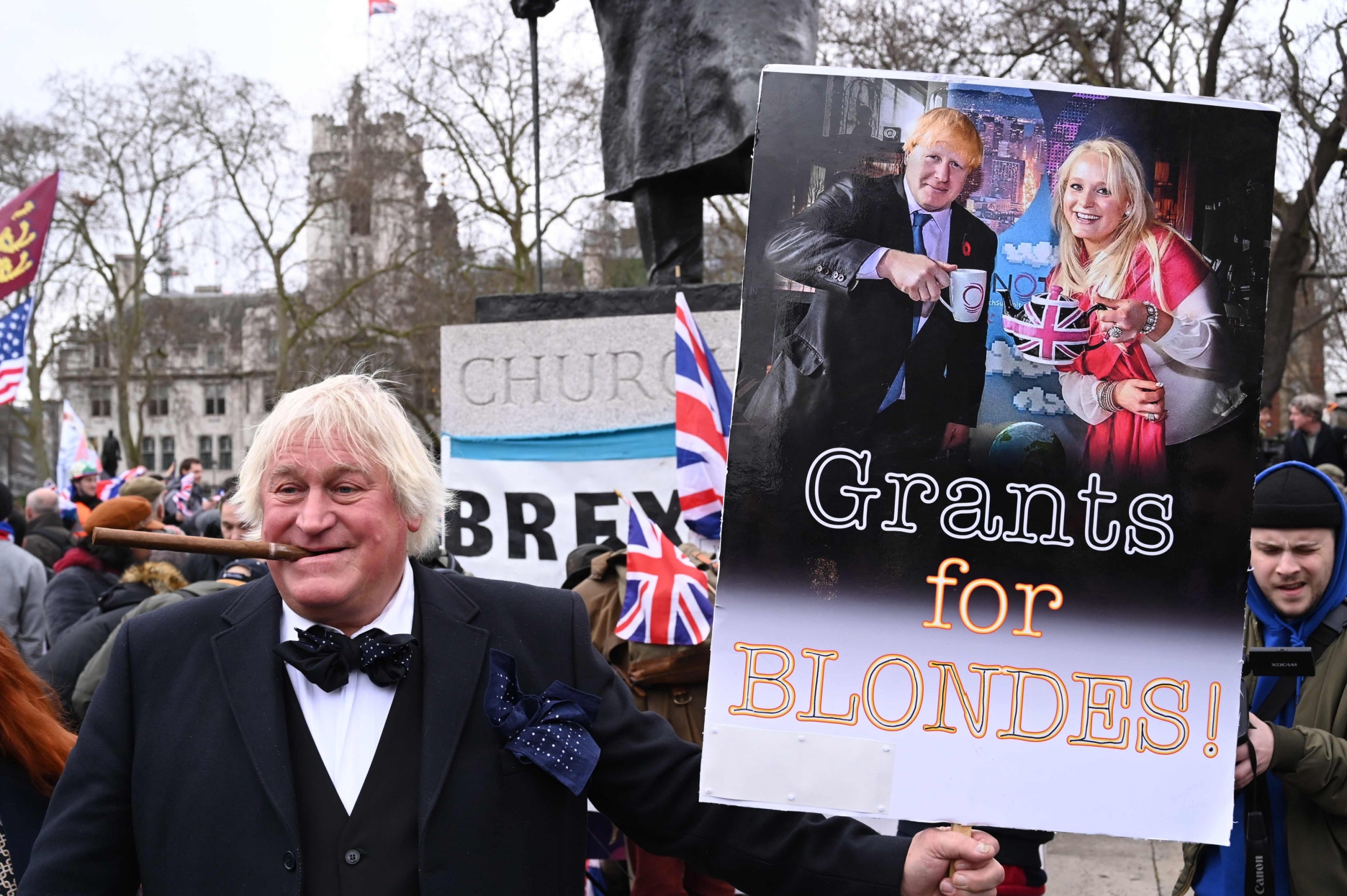
35/66
AFP via Getty
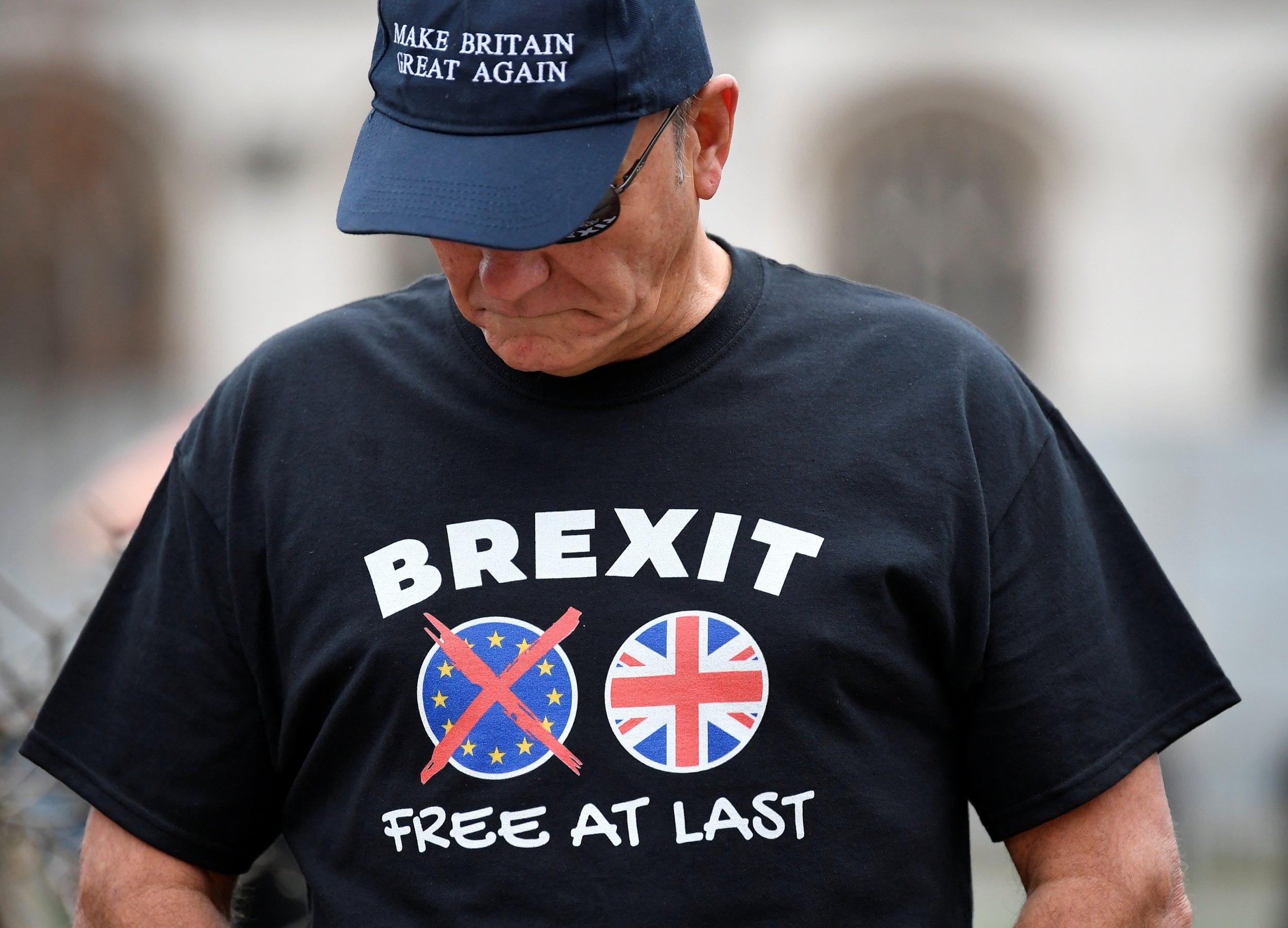
36/66
A man wears a pro-Brexit t-shirt
Reuters
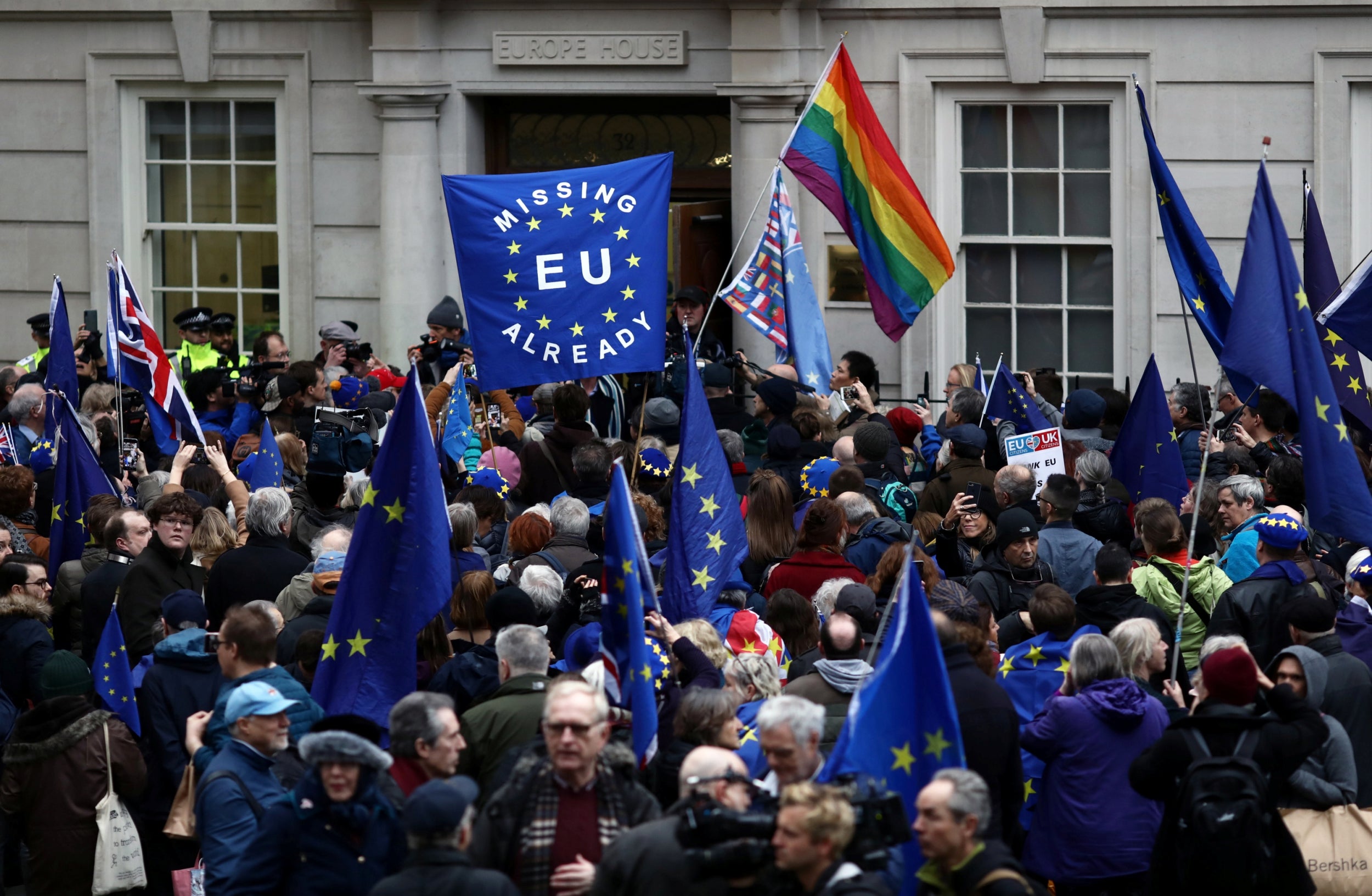
37/66
Anti-Brexit demonstrators visit Europe House to give flowers to the staff on Brexit day
Reuters
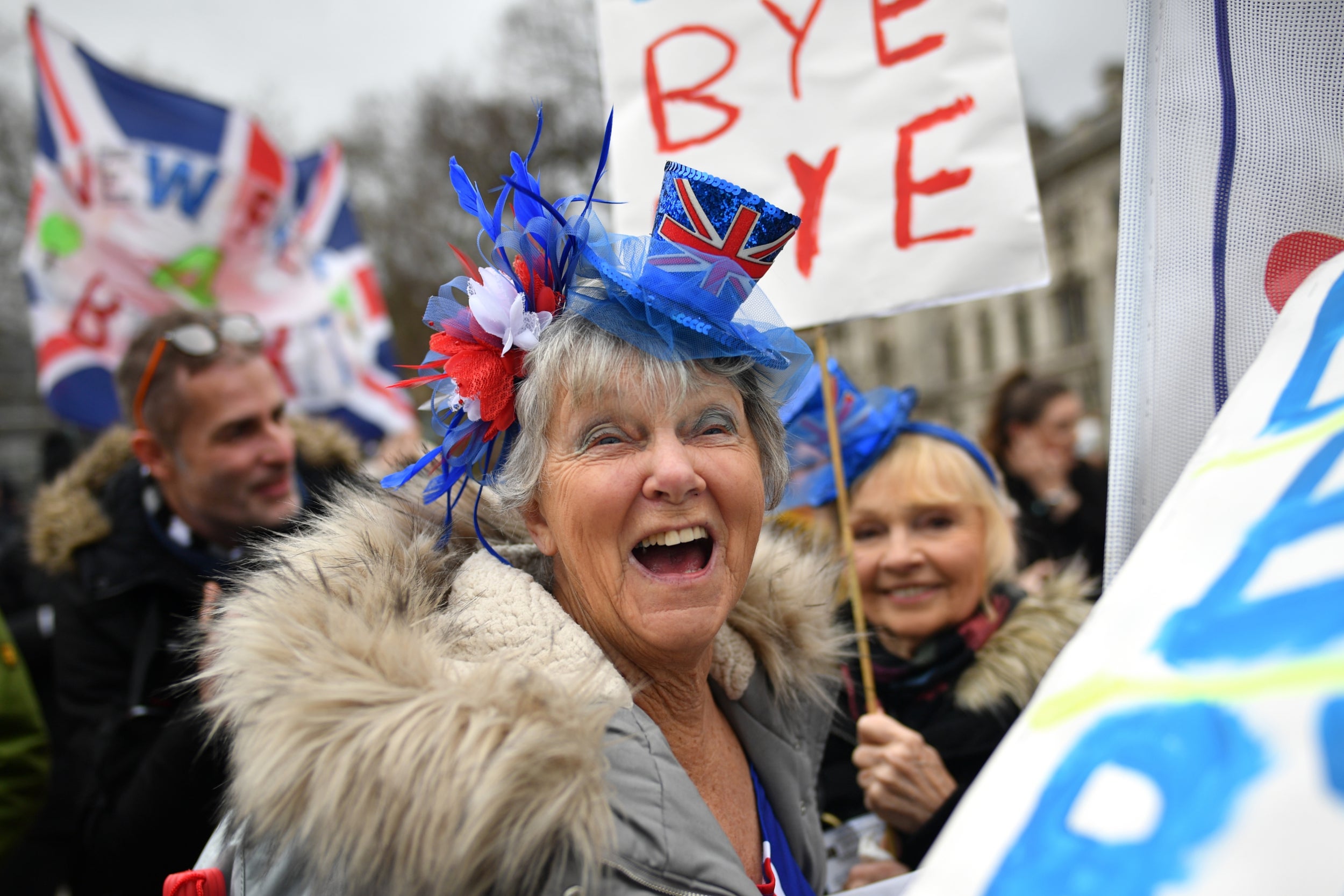
38/66
Pro Brexit supporter wears a novelty Union Jack top hat outside the Houses of Parliament
Getty Images

39/66
Customers Scott Jones and Laura Jones at the Sawmill Bar in South Elmsall, Yorkshire, where a Brexit party is being held throughout the day
PA
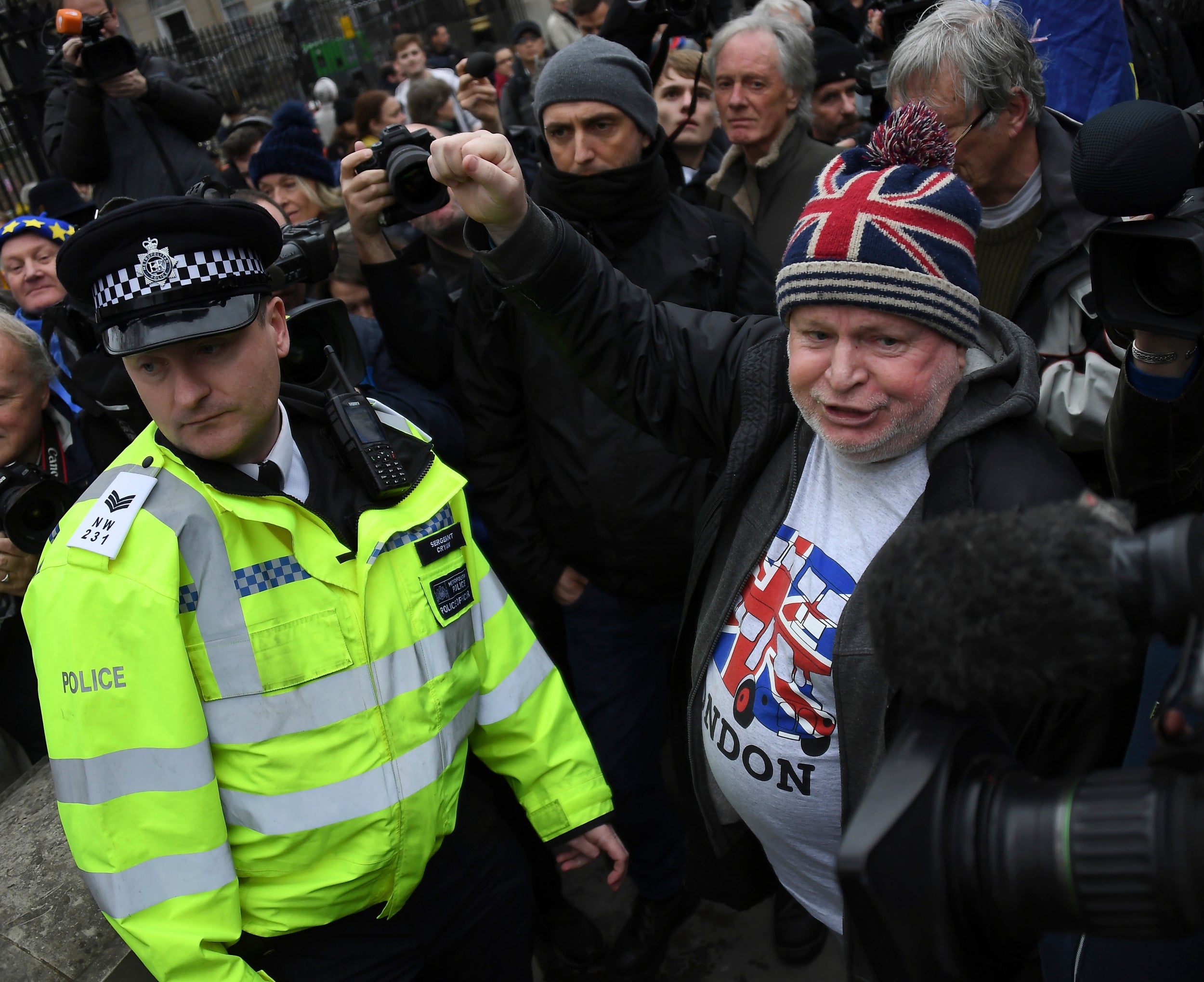
40/66
AP
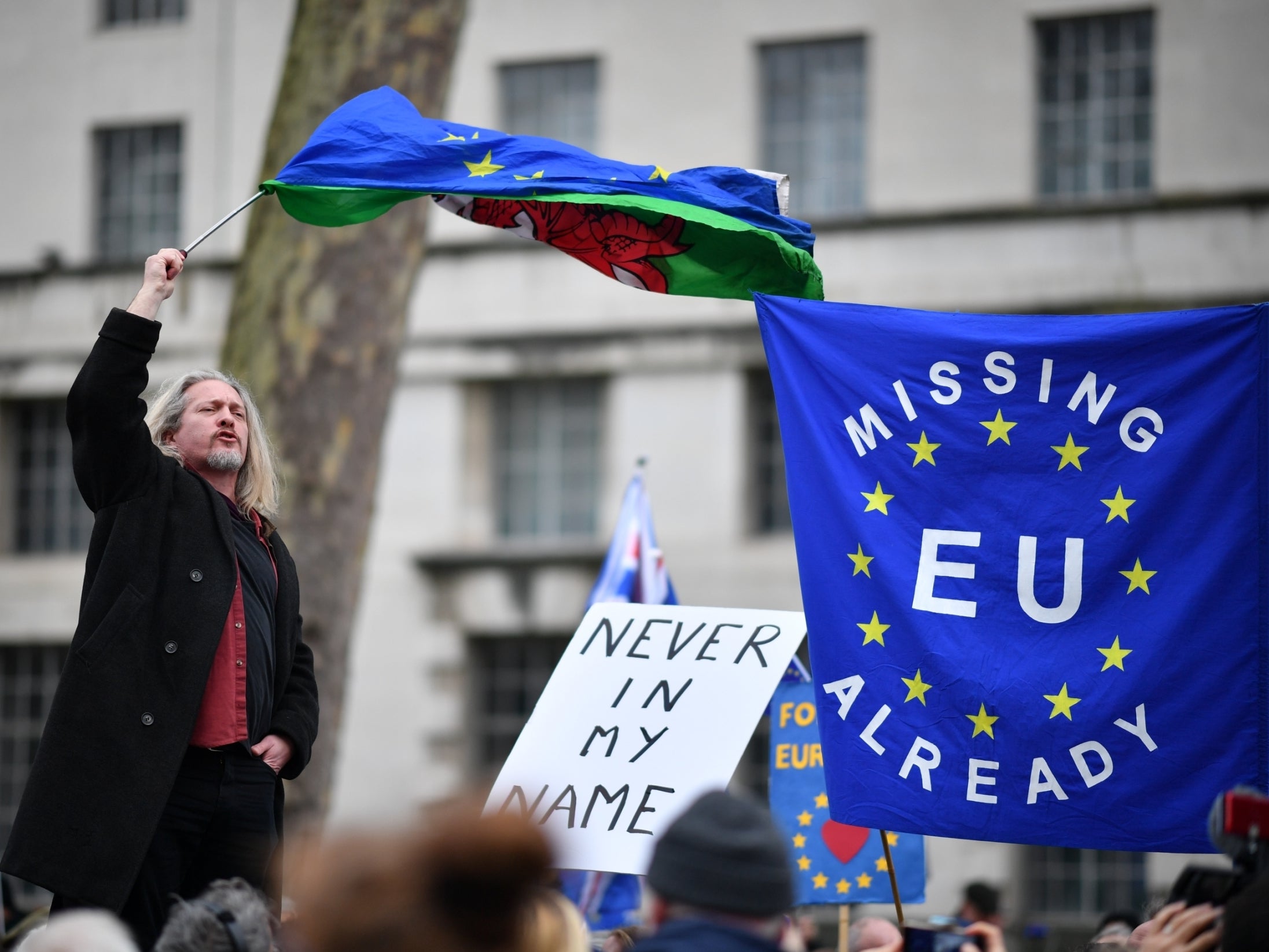
41/66
Getty

42/66
Getty Images
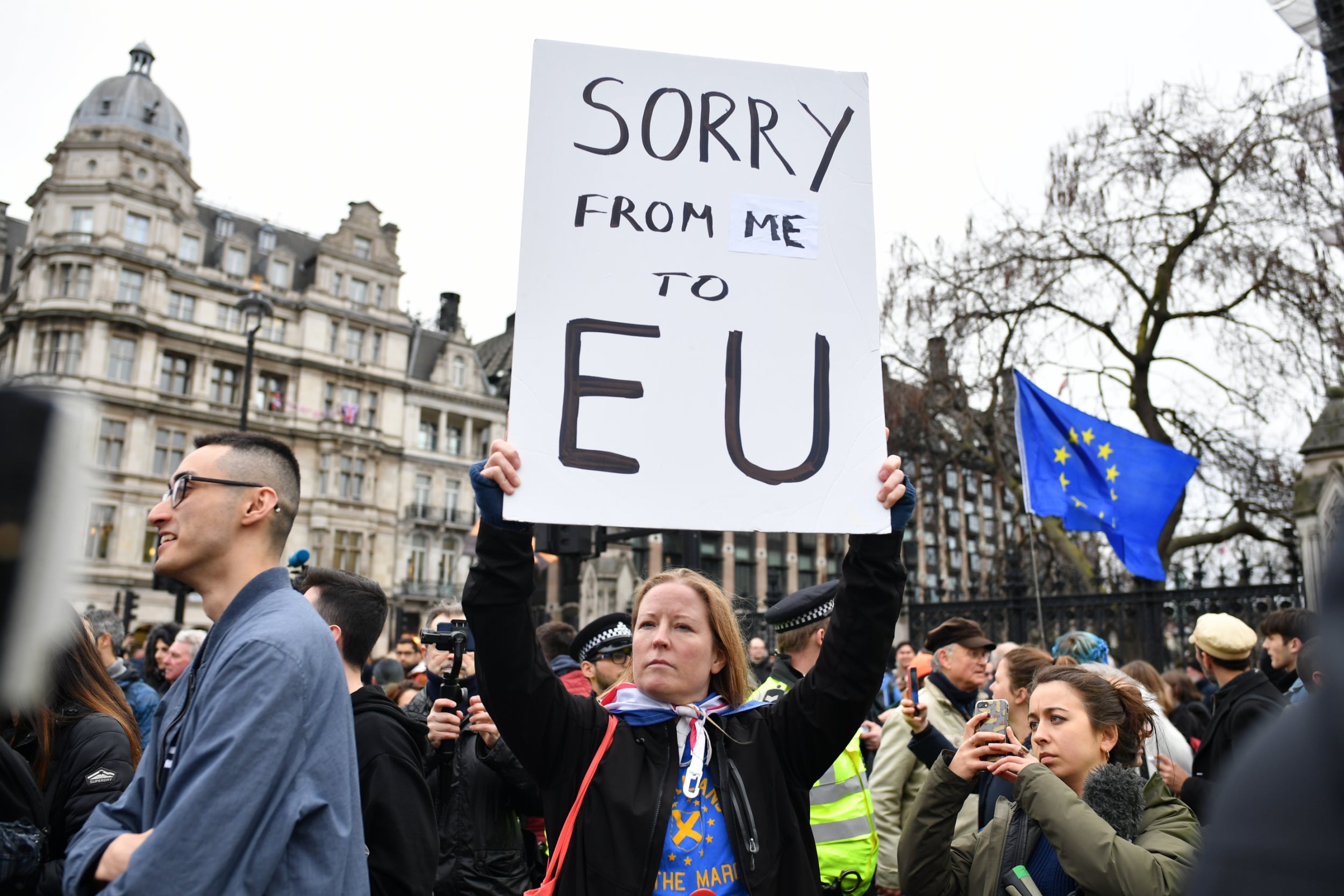
43/66
Pro-EU activists protest
Getty Images
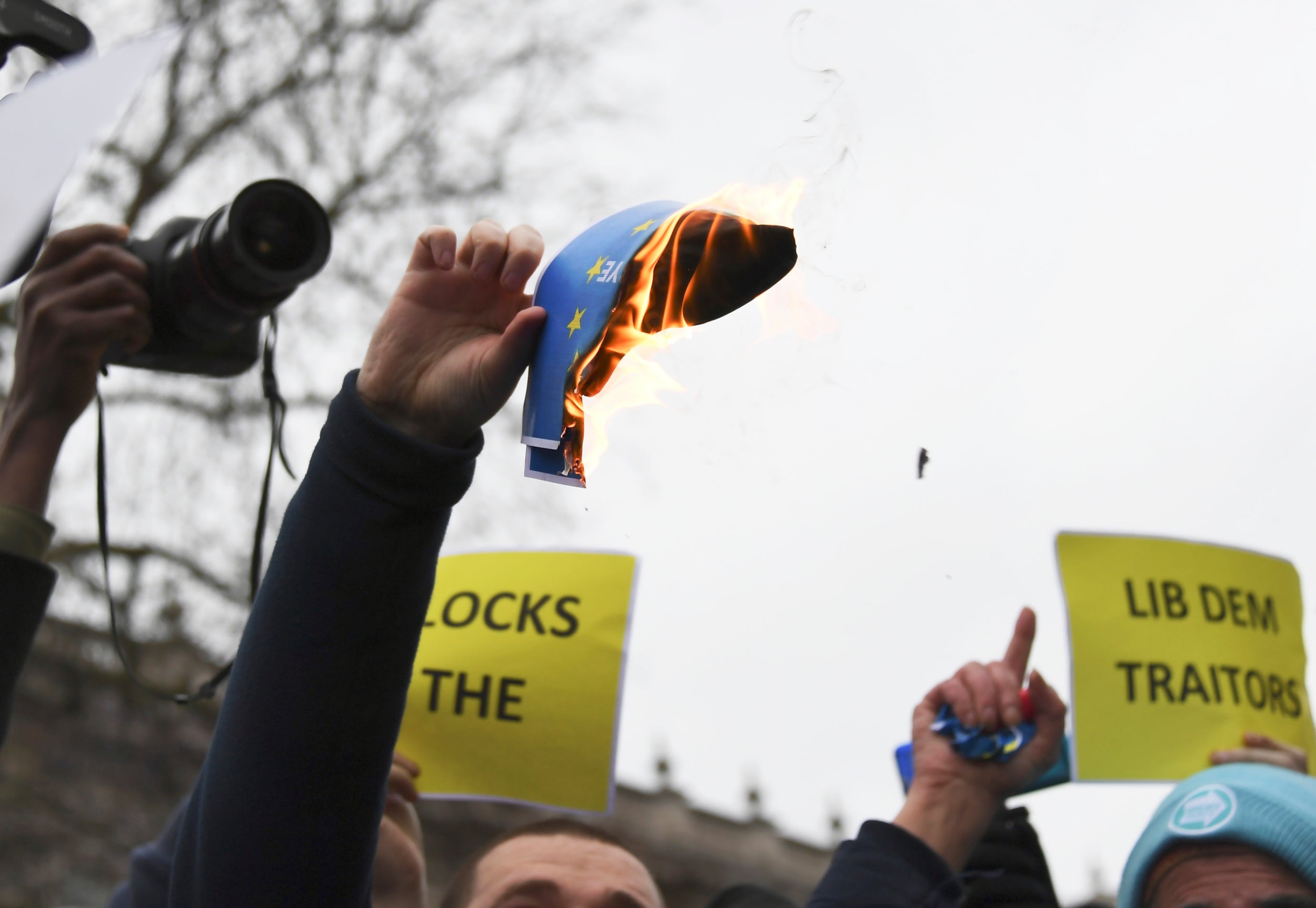
44/66
A pro-Brexit demonstrator burns a European Union flag
AP
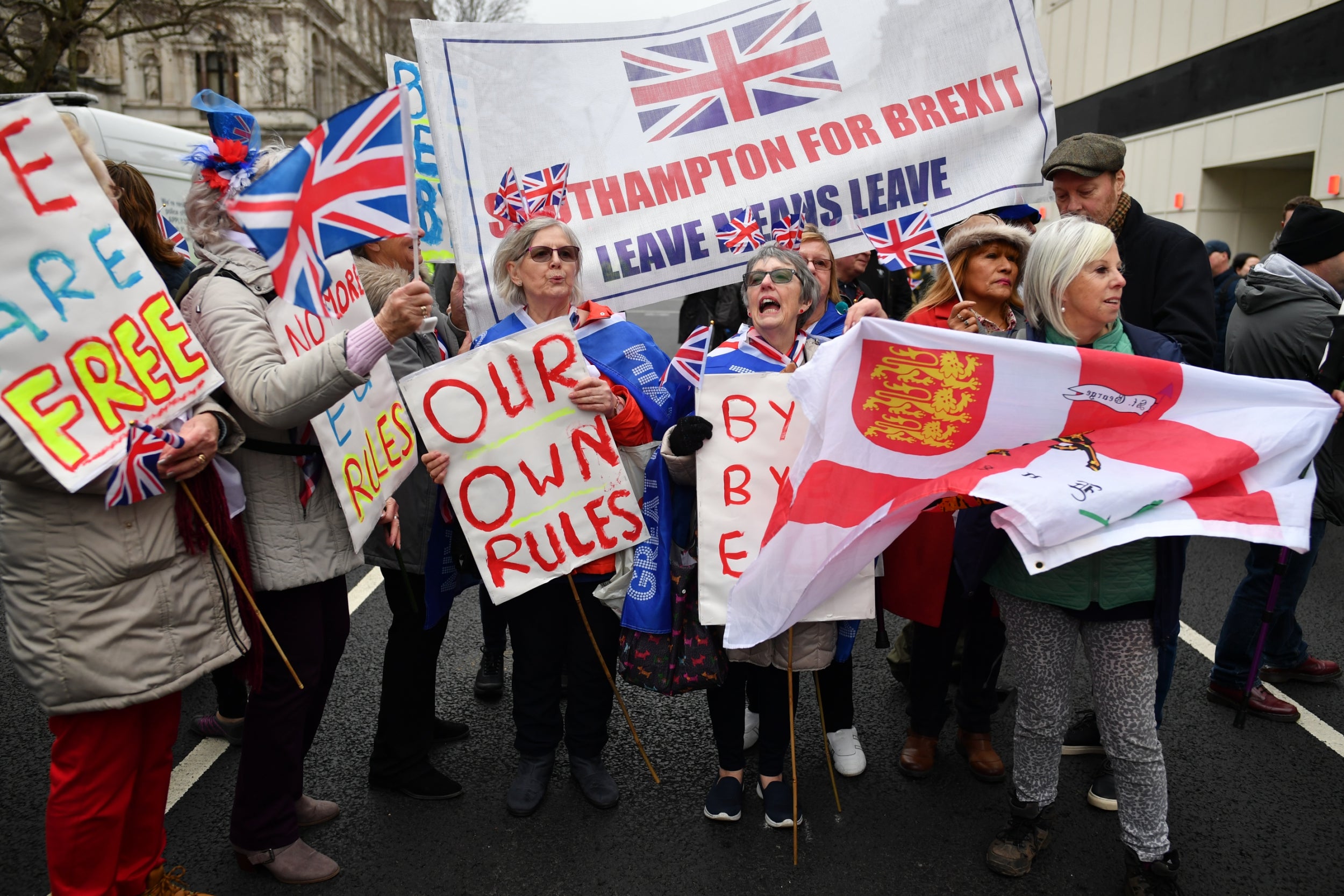
45/66
Pro Brexit supporters
Getty Images
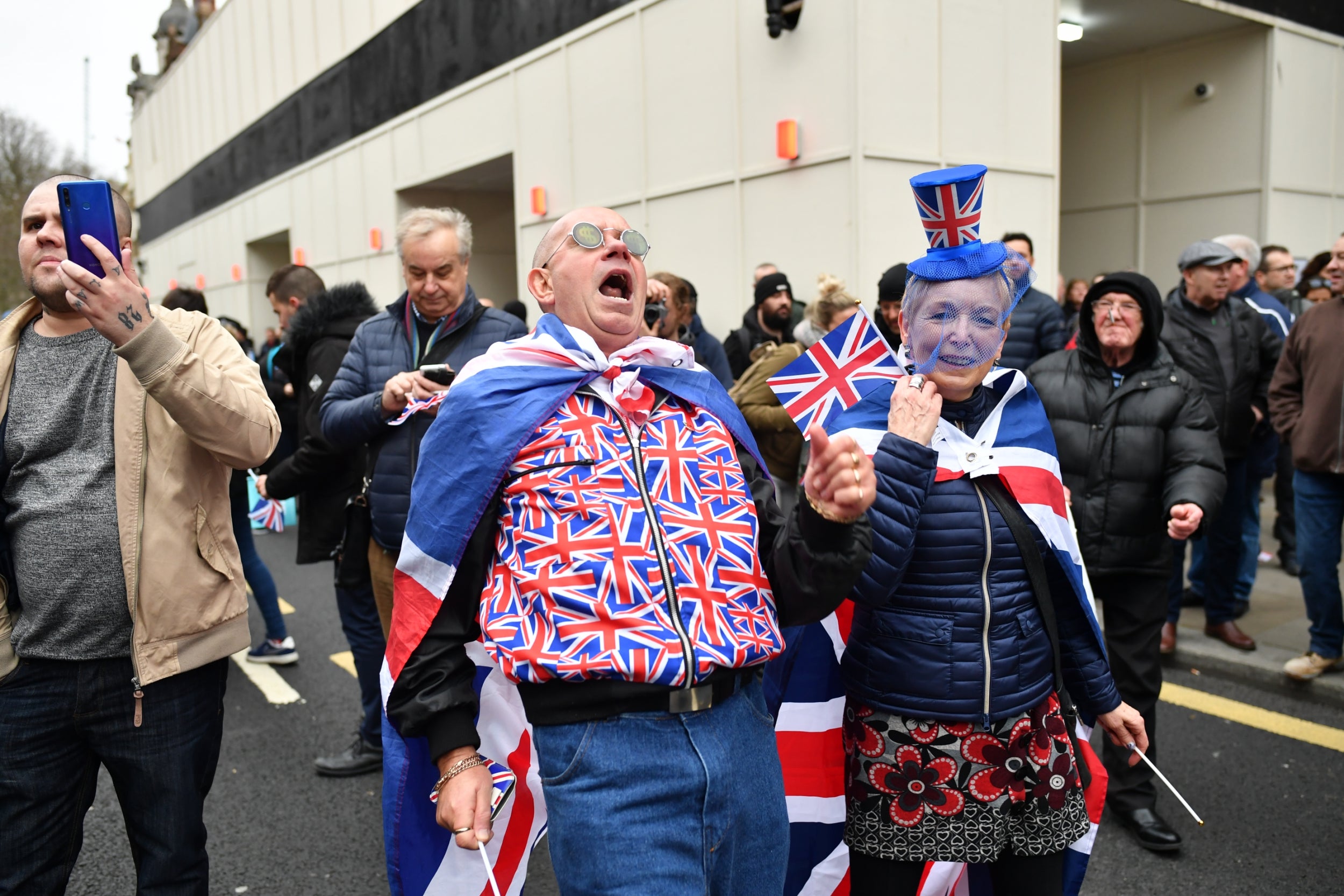
46/66
Pro Brexit supporters
Getty Images

47/66
A Brexit supports holds a sign in Parliament Square
AP
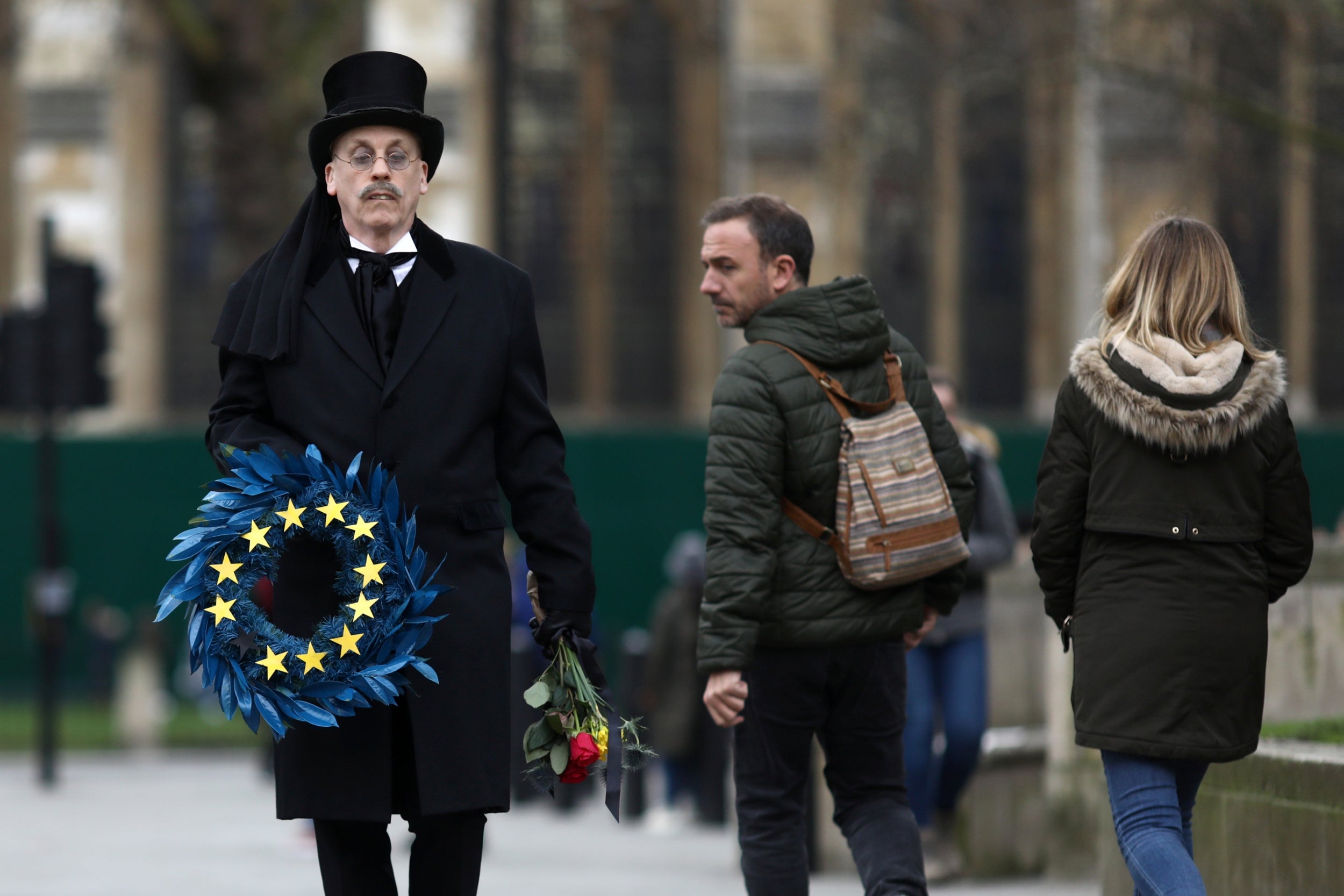
48/66
A man carries an EU themed wreath
Reuters
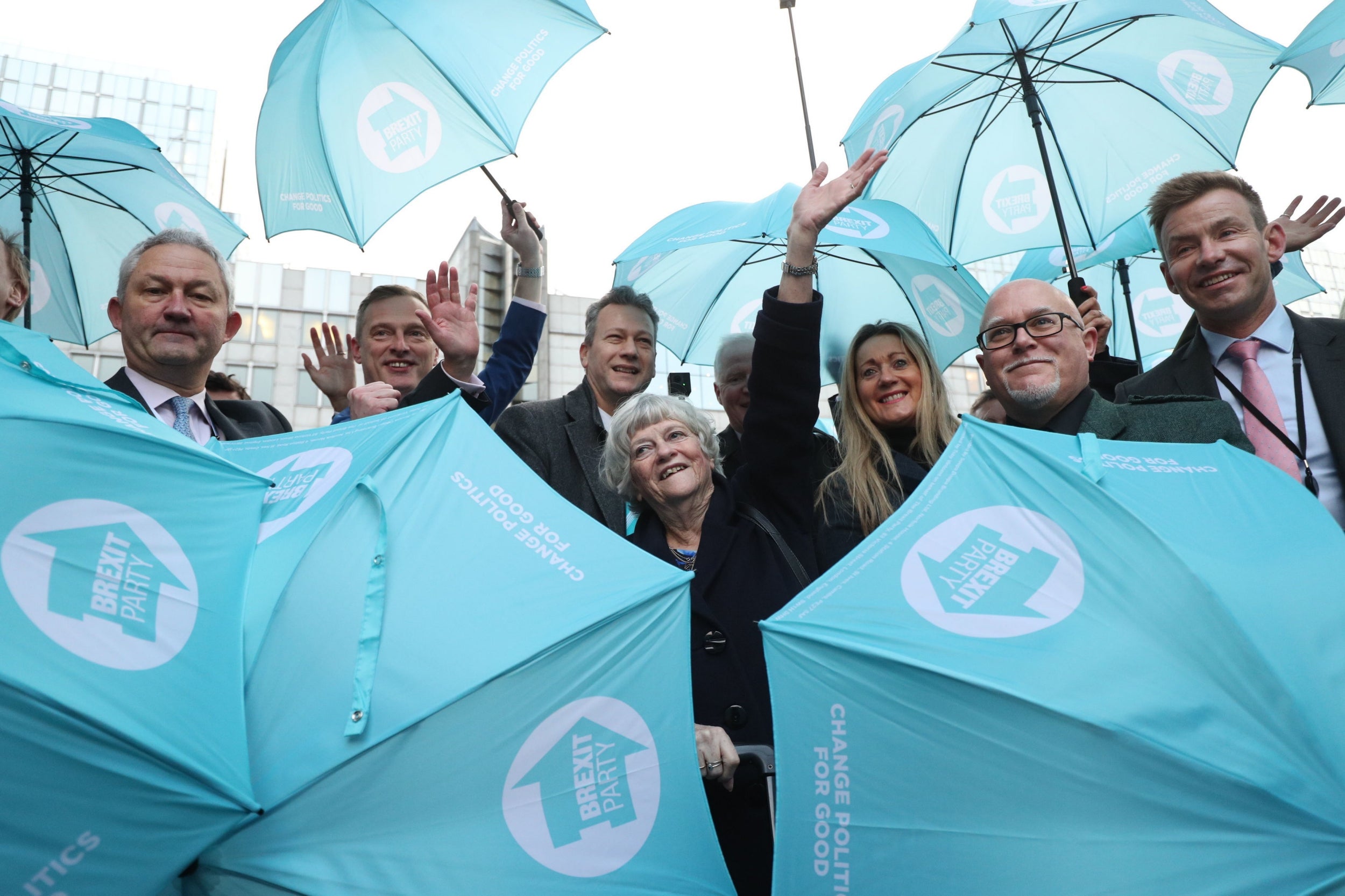
49/66
Ann Widdecombe reacts with other members of the Brexit party as they leave en masse from the European Parliament
PA
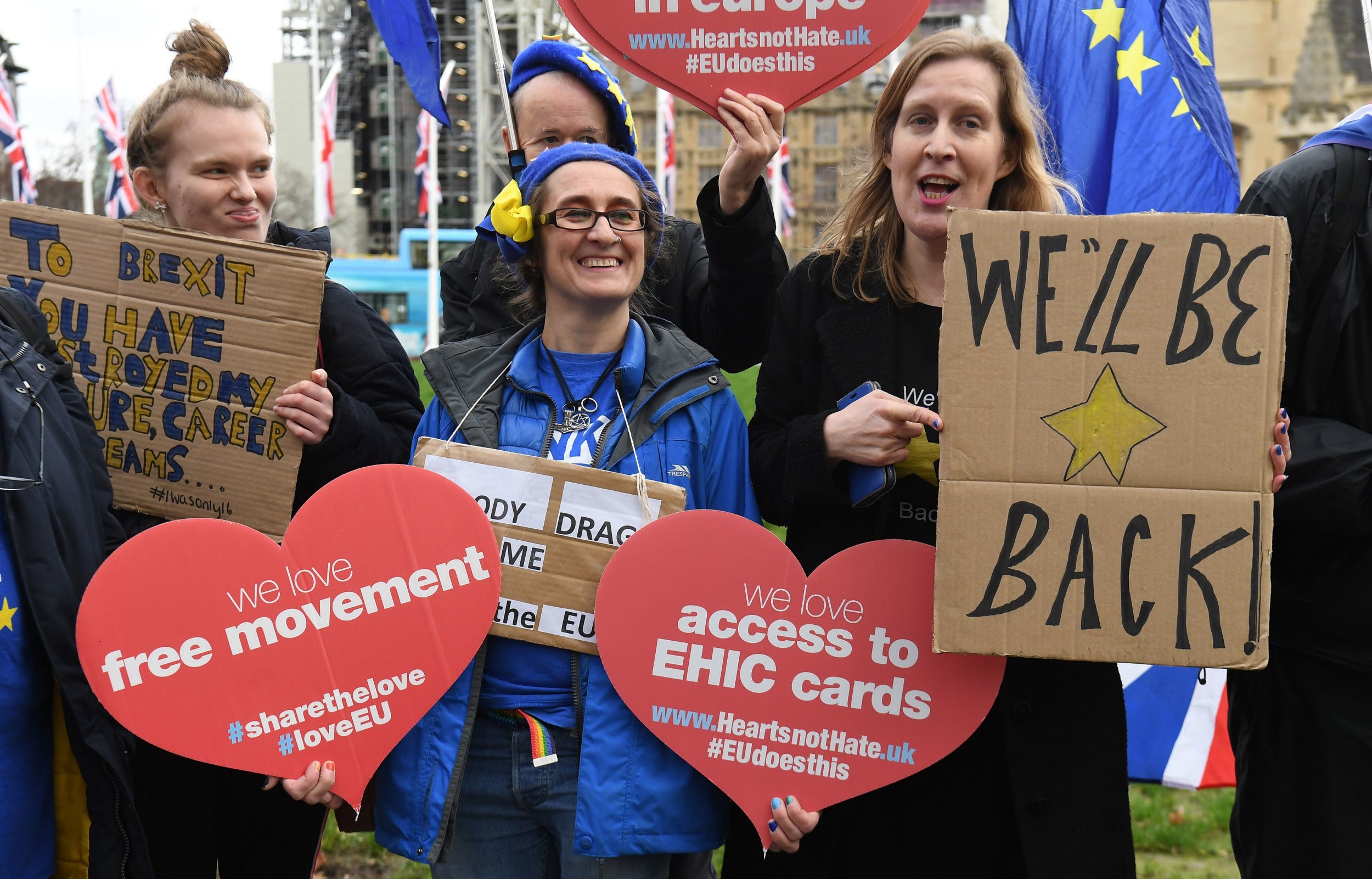
50/66
Anti-Brexit demonstrators in Parliament Square
PA

51/66
Pro EU supporters let off flares from Westminster Bridge
Getty
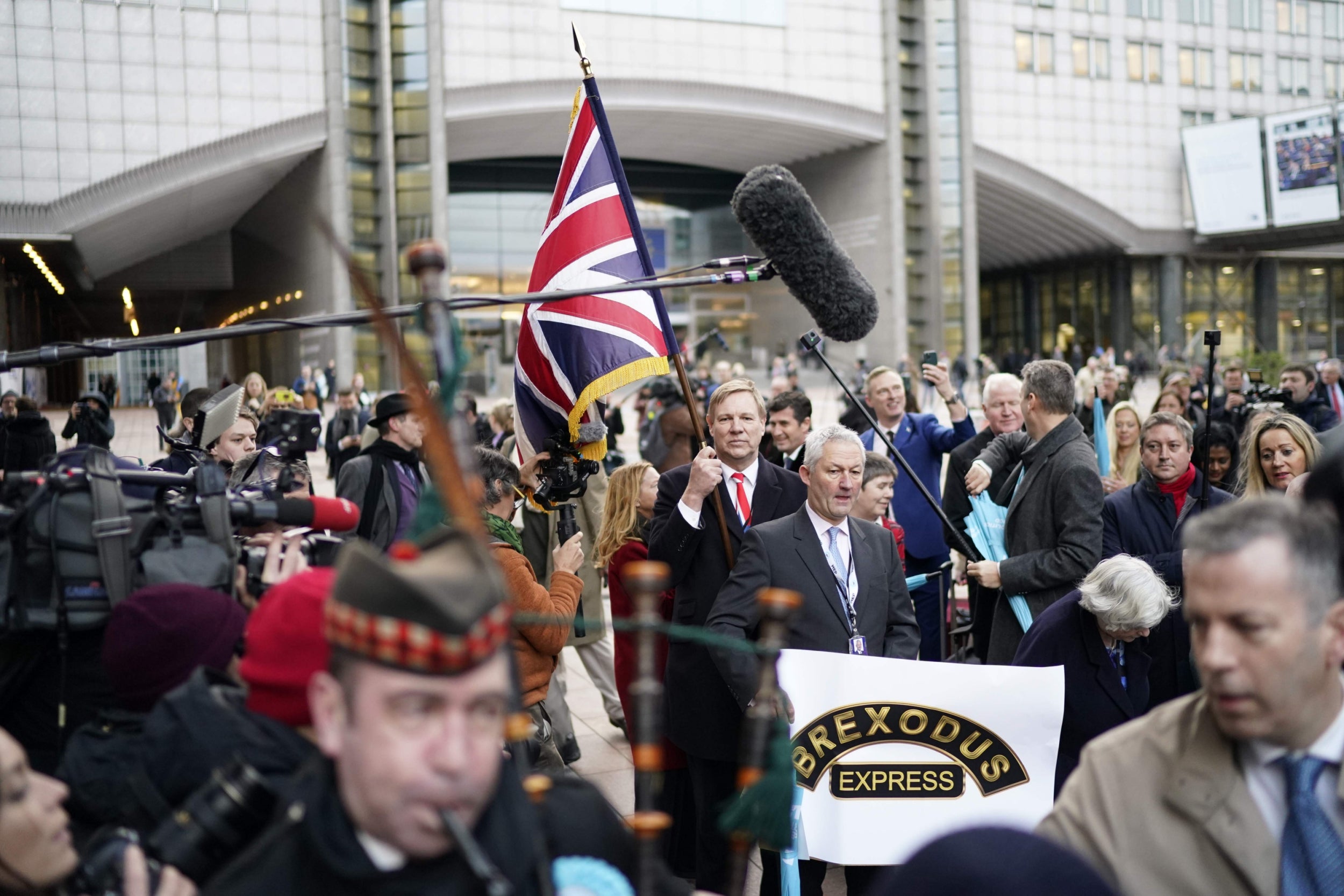
52/66
British MEPs Jonathan Bullock, holding the Union Jack flag and Jake Pugh leave the European Parliament, in Brussels on the Brexit day
AFP via Getty
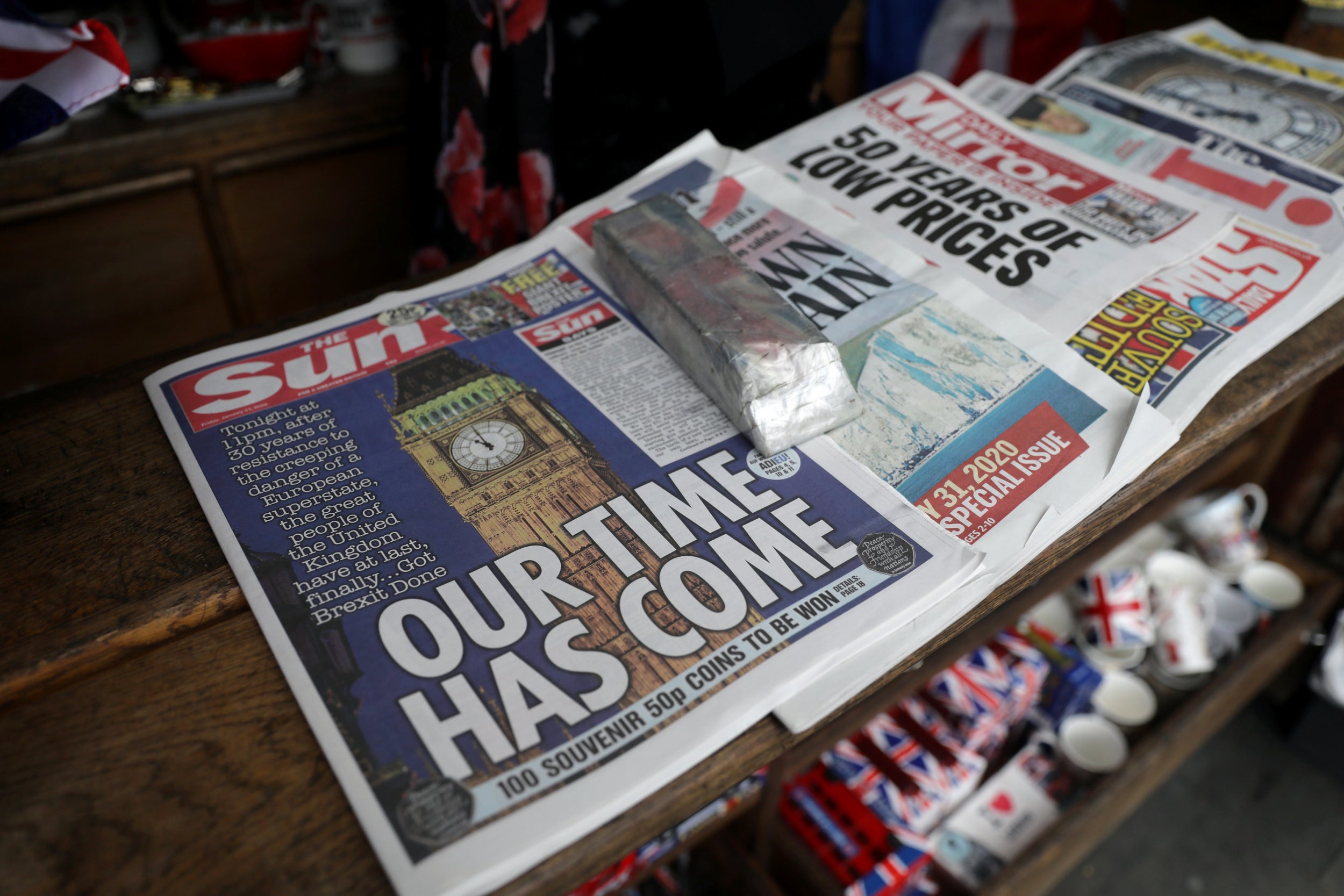
53/66
Newspapers and other souvenirs at a store, near Parliament Square
Reuters
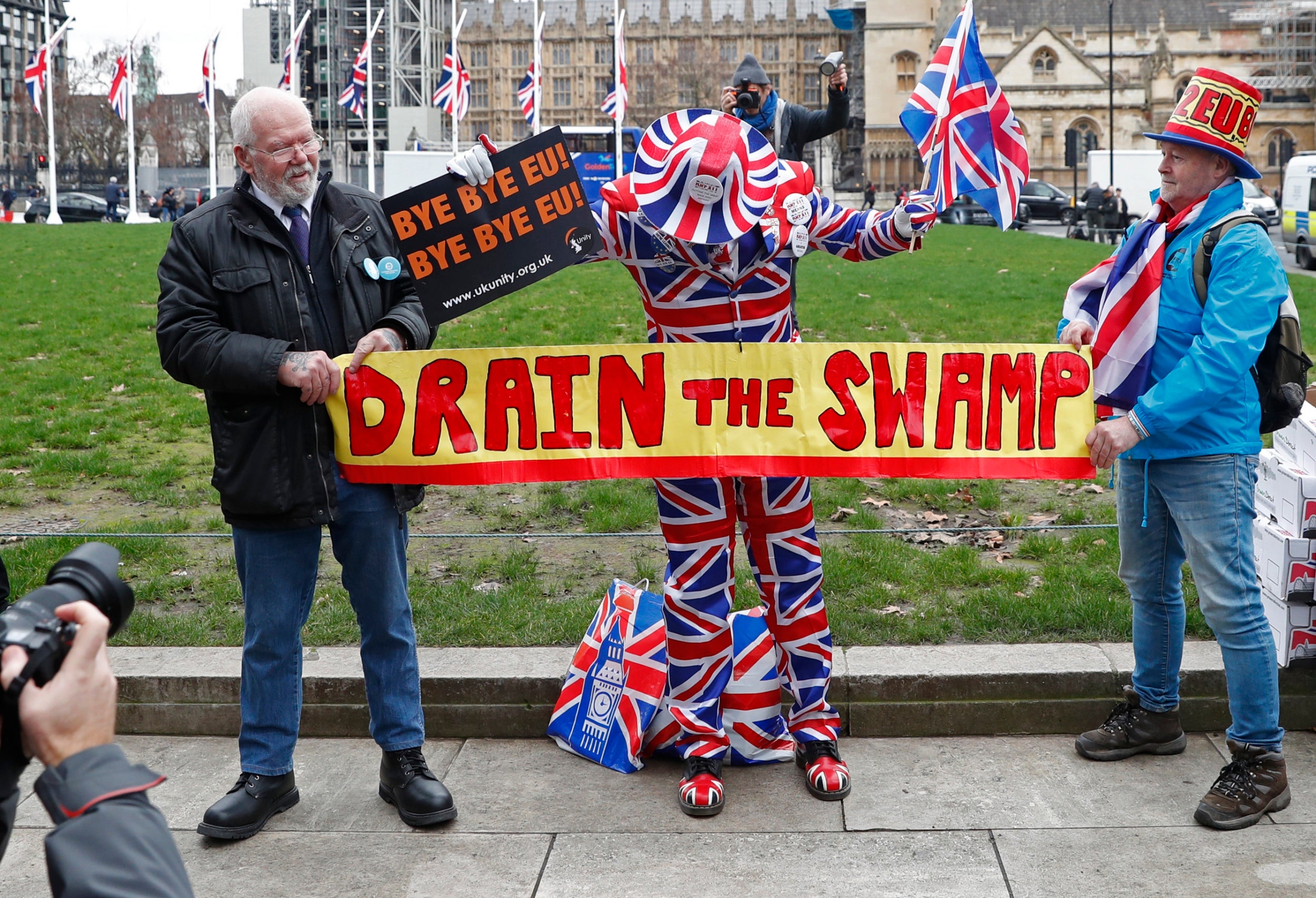
54/66
Brexit supporters hold signs in Parliament Square
AP
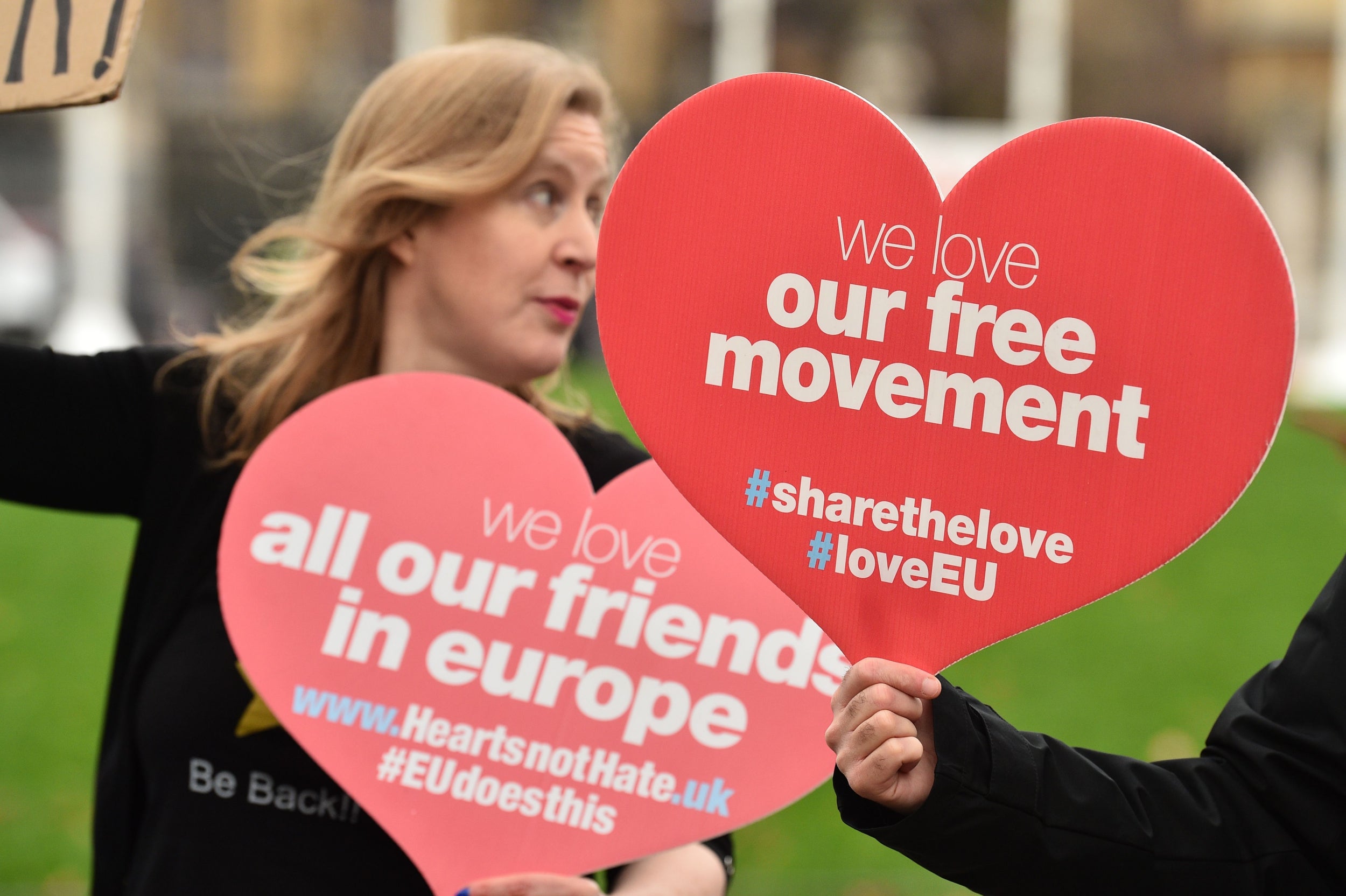
55/66
Pro-EU protesters hold placards in Parliament Square
AFP via Getty
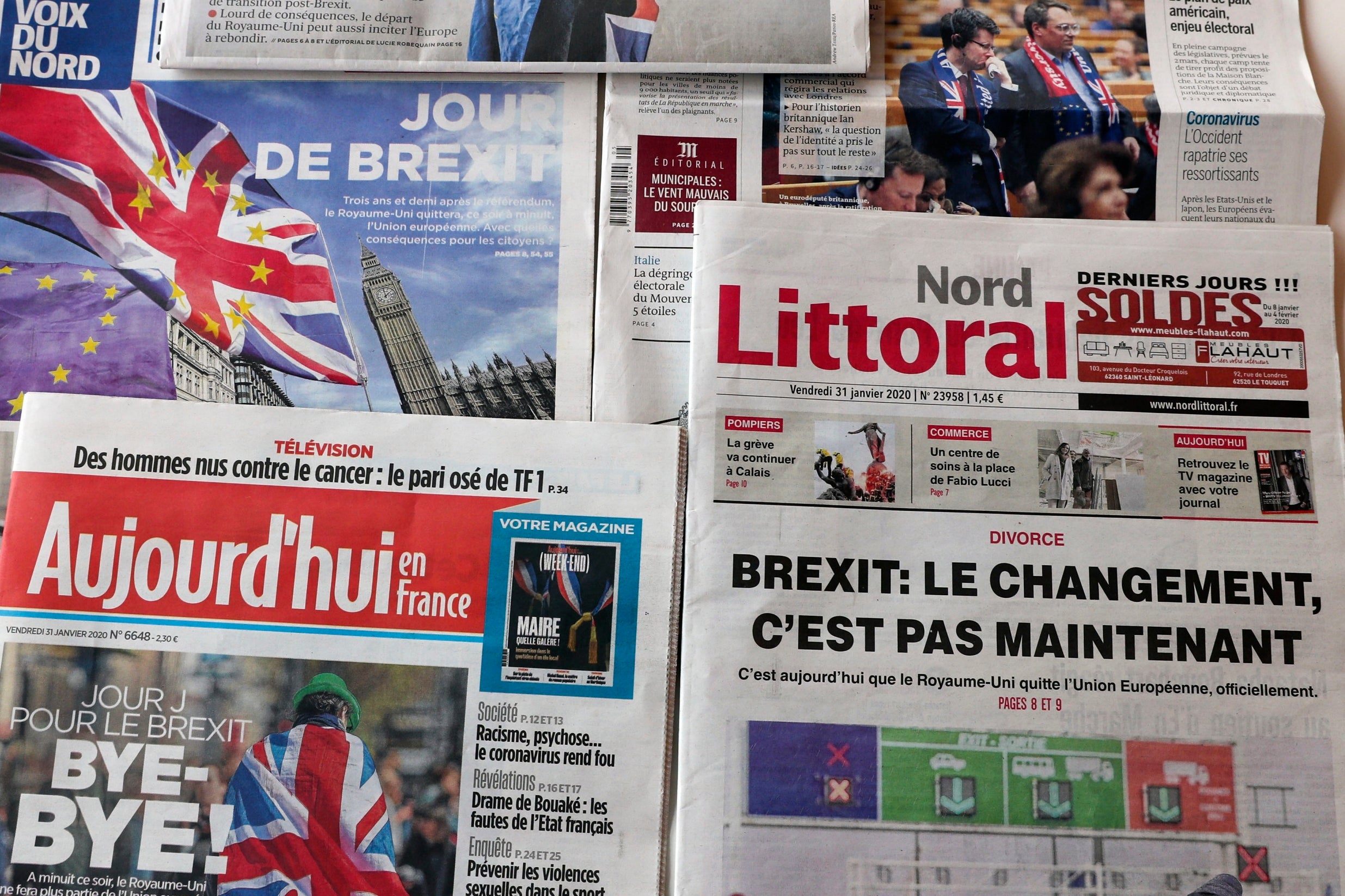
56/66
French newspapers
PA

57/66
Sinn Fein leader Mary Lou McDonald with a Border Communities Against Brexit poster before its unveiling in Carrickcarnon on the Irish border
PA
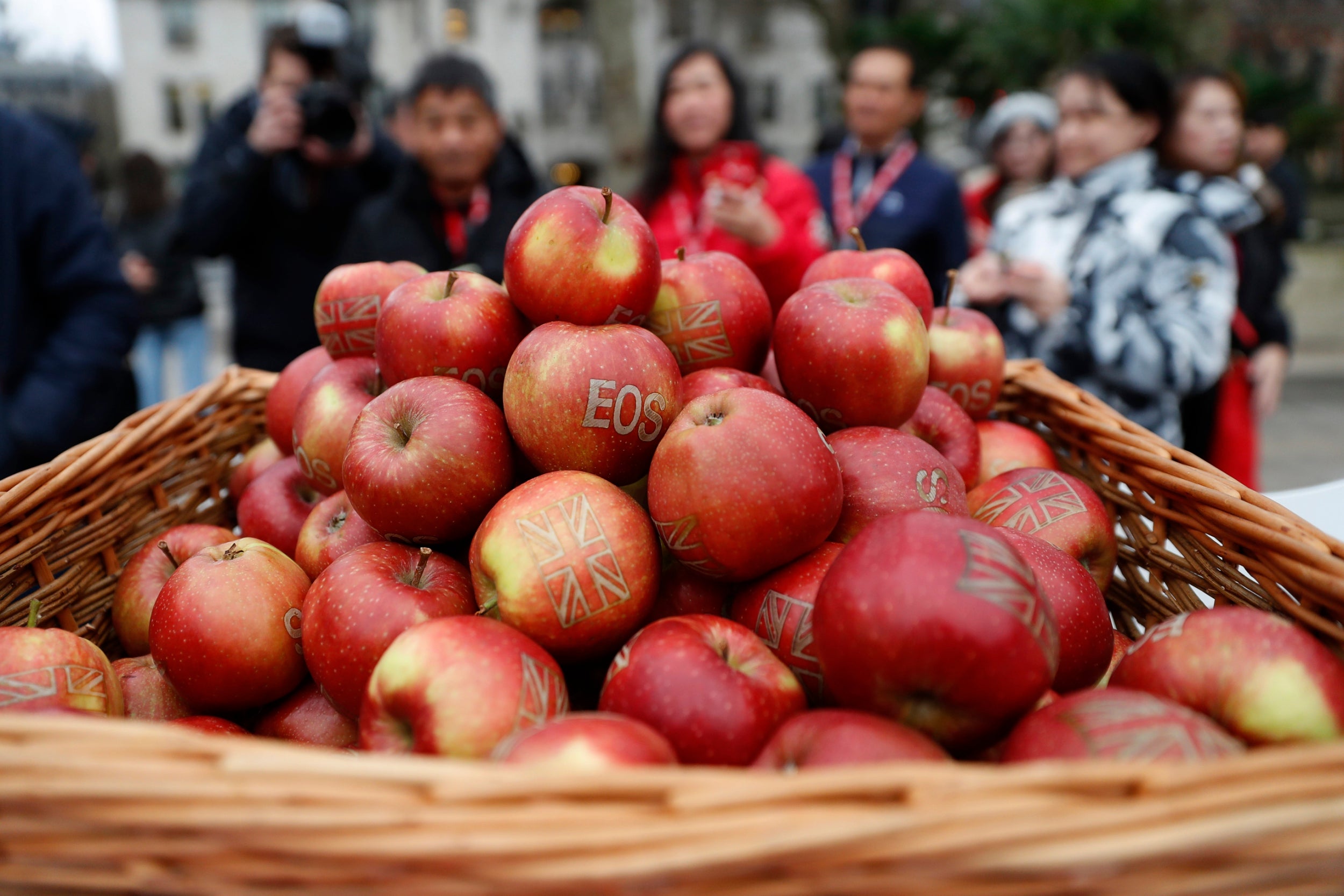
58/66
National growers organisation British Apples & Pears has renamed a British apple to EOS, the Greek goddess of dawn, to commemorate Brexit day
AP
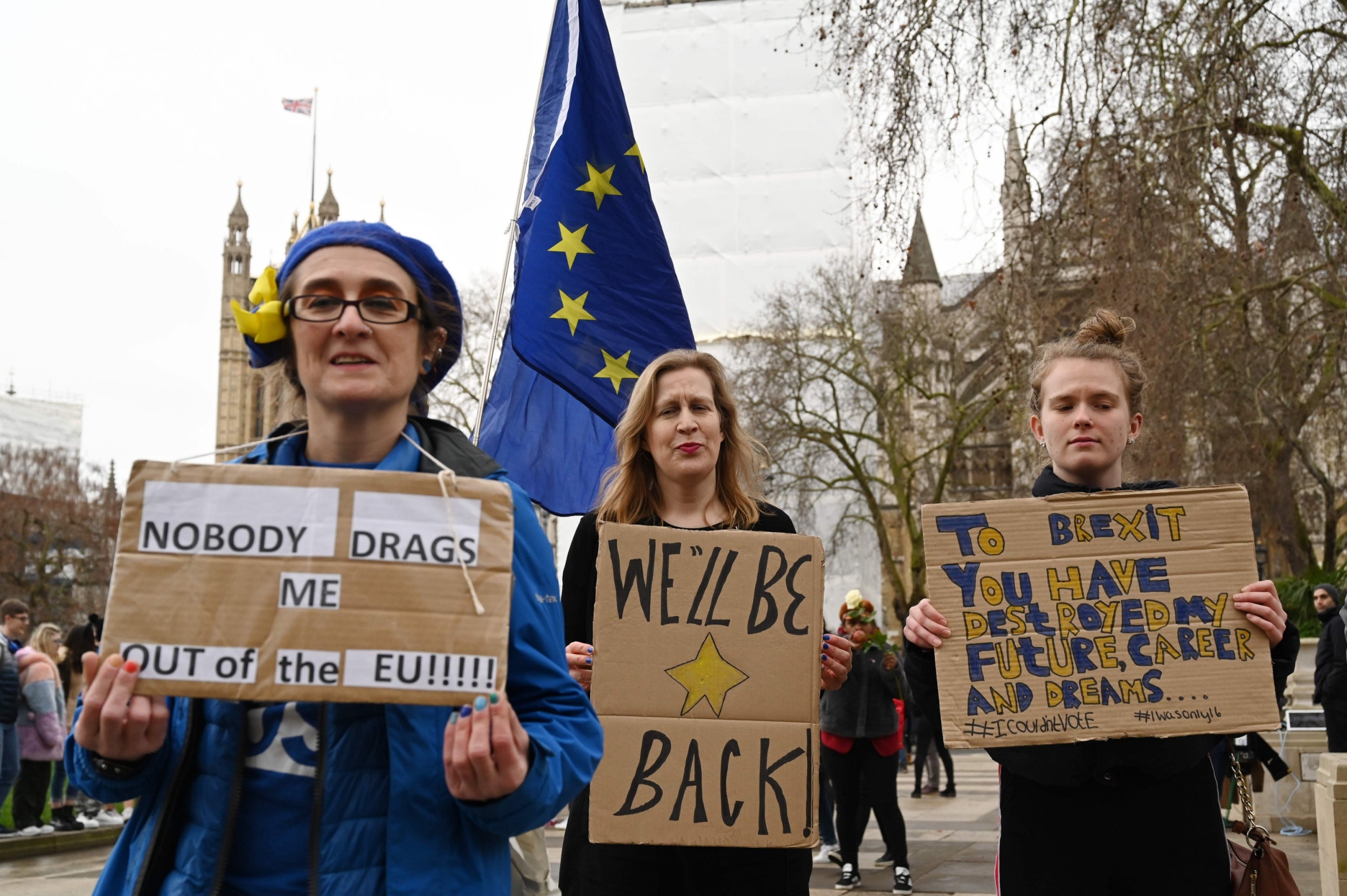
59/66
Pro-EU protesters hold placards in Parliament Square
AFP via Getty
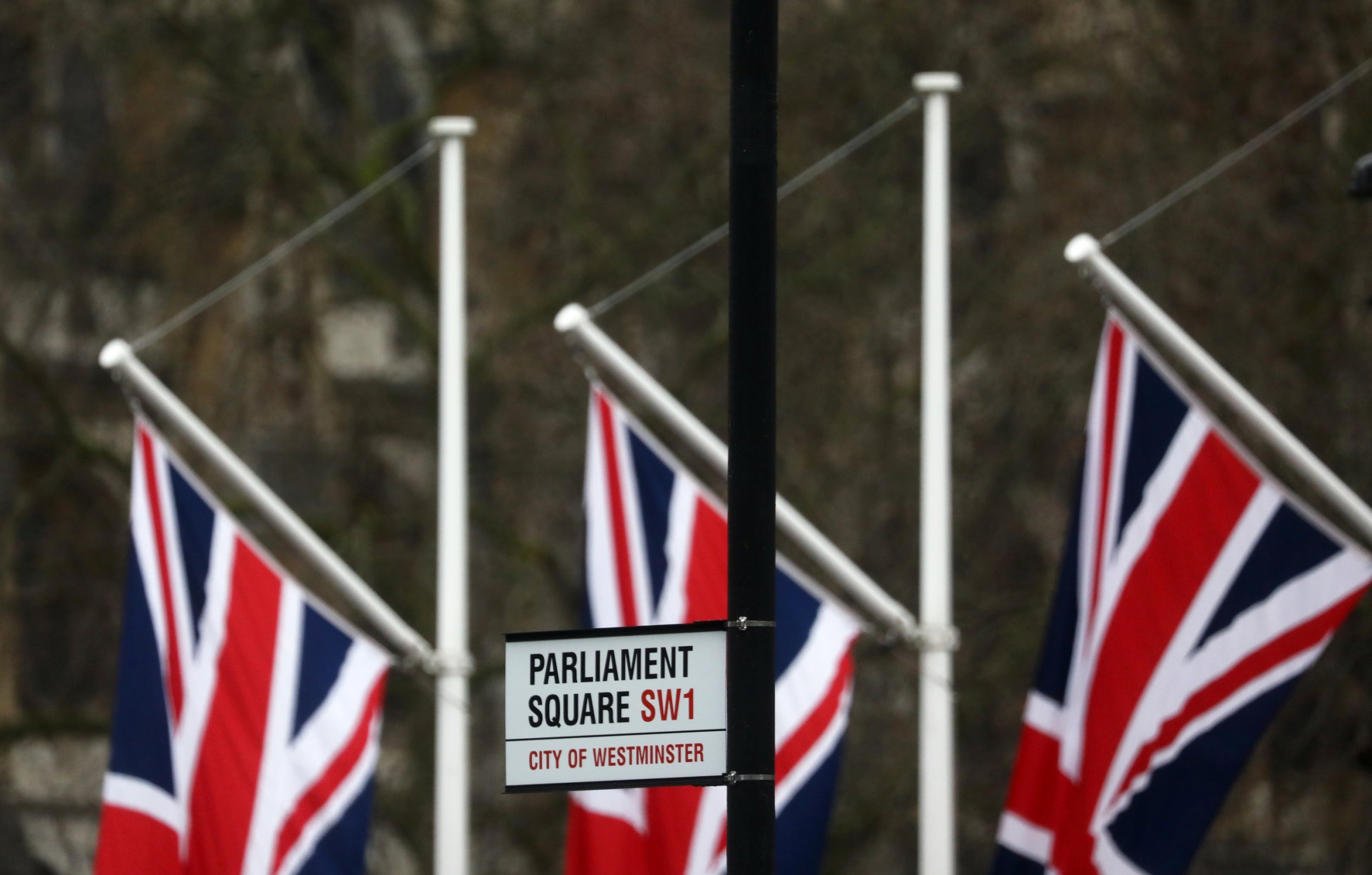
60/66
Britain’s departure from the European Union was set in law on January 29, amid emotional scenes, as the bloc’s parliament voted to ratify the divorce papers. After half a century of membership and three years of tense withdrawal talks, the UK will leave the EU at midnight Brussels time (23.00 GMT) on January 31
Reuters
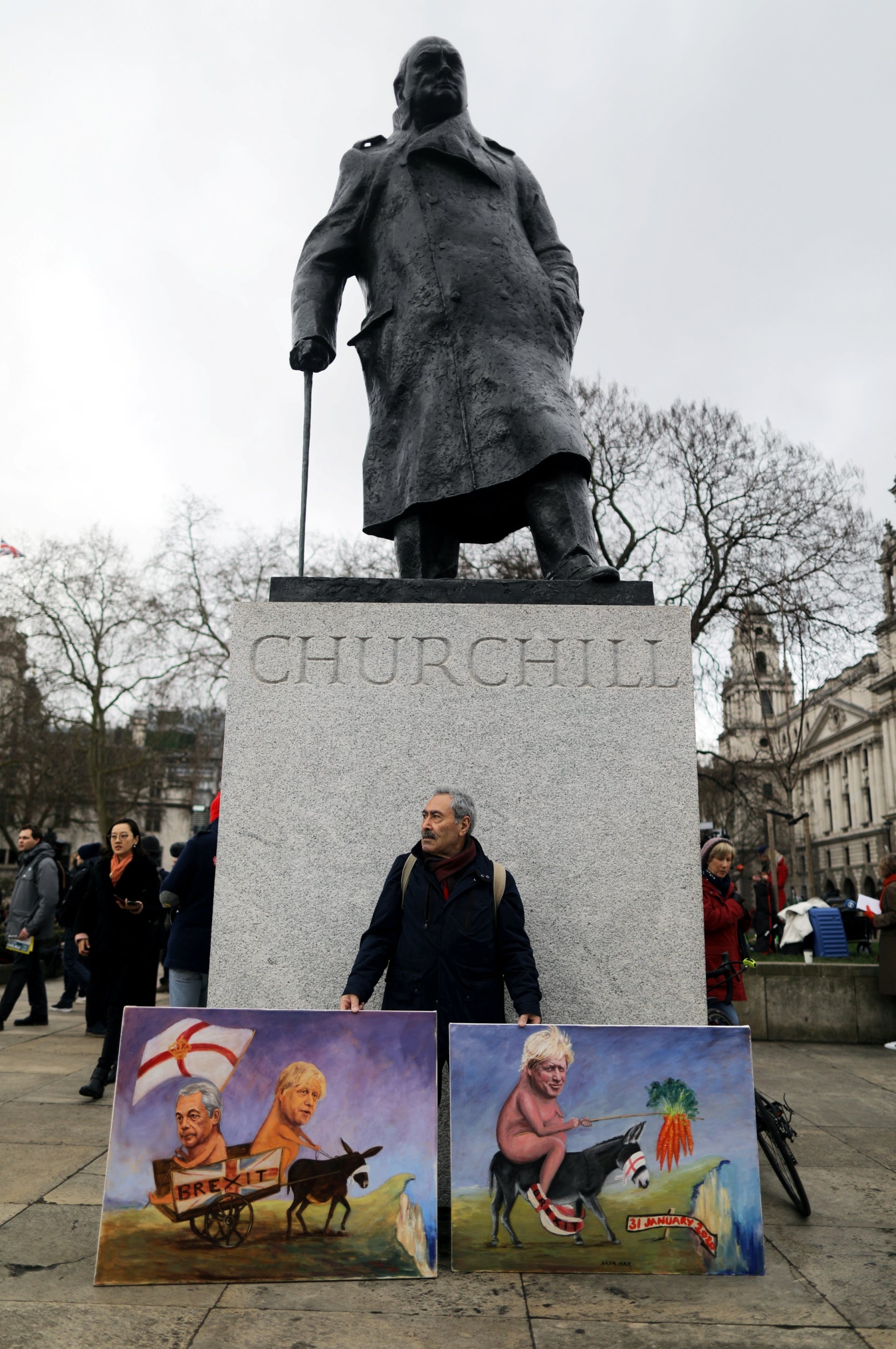
61/66
A man poses with paintings on Parliament Square
Reuters
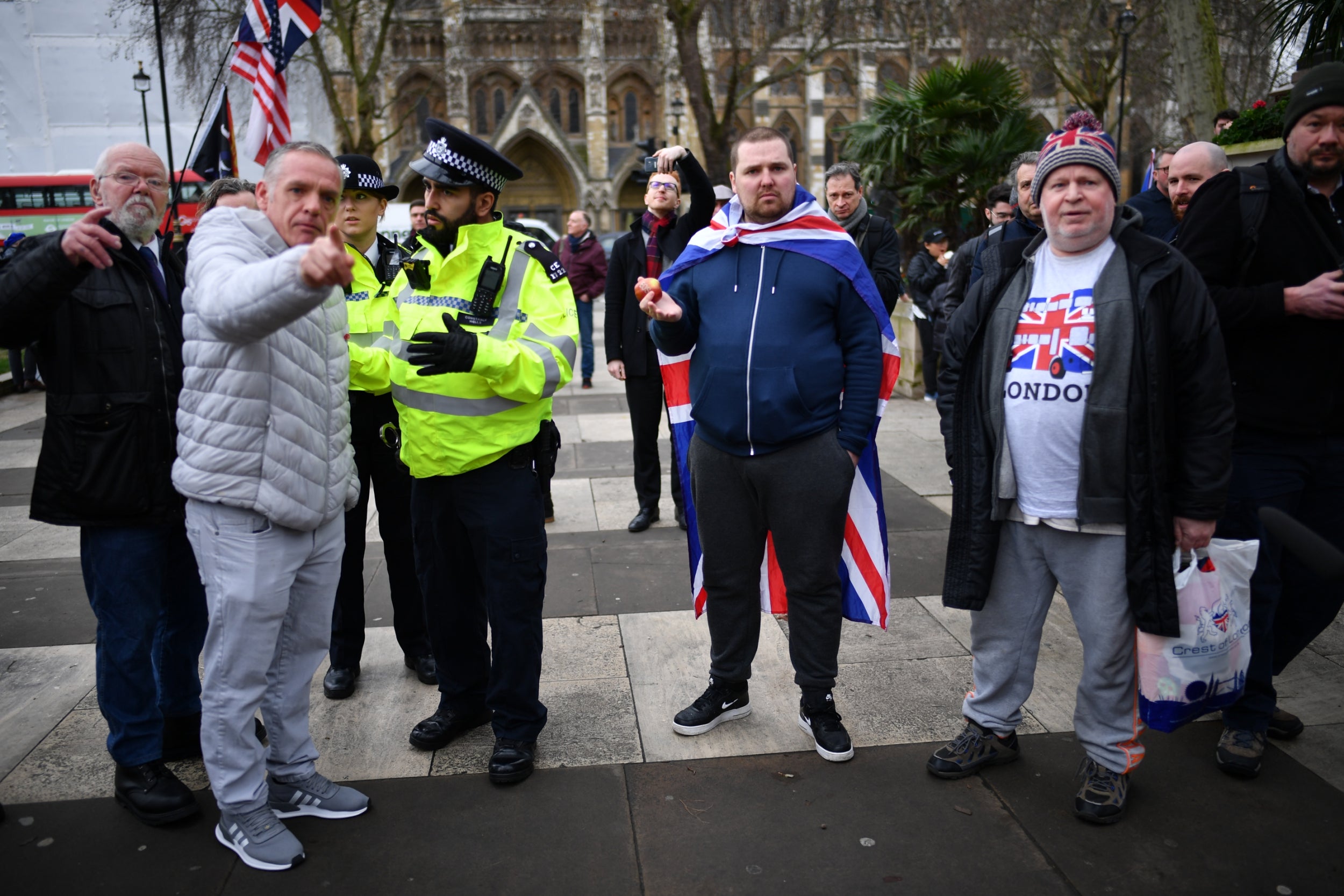
62/66
People sporting Union Flags gather in Parliament Square
Getty

63/66
A man walks with a St. George’s flag at Westminster bridge on Brexit day
Reuters

64/66
A British bulldog toy and other souvenirs at a souvenir store
Reuters
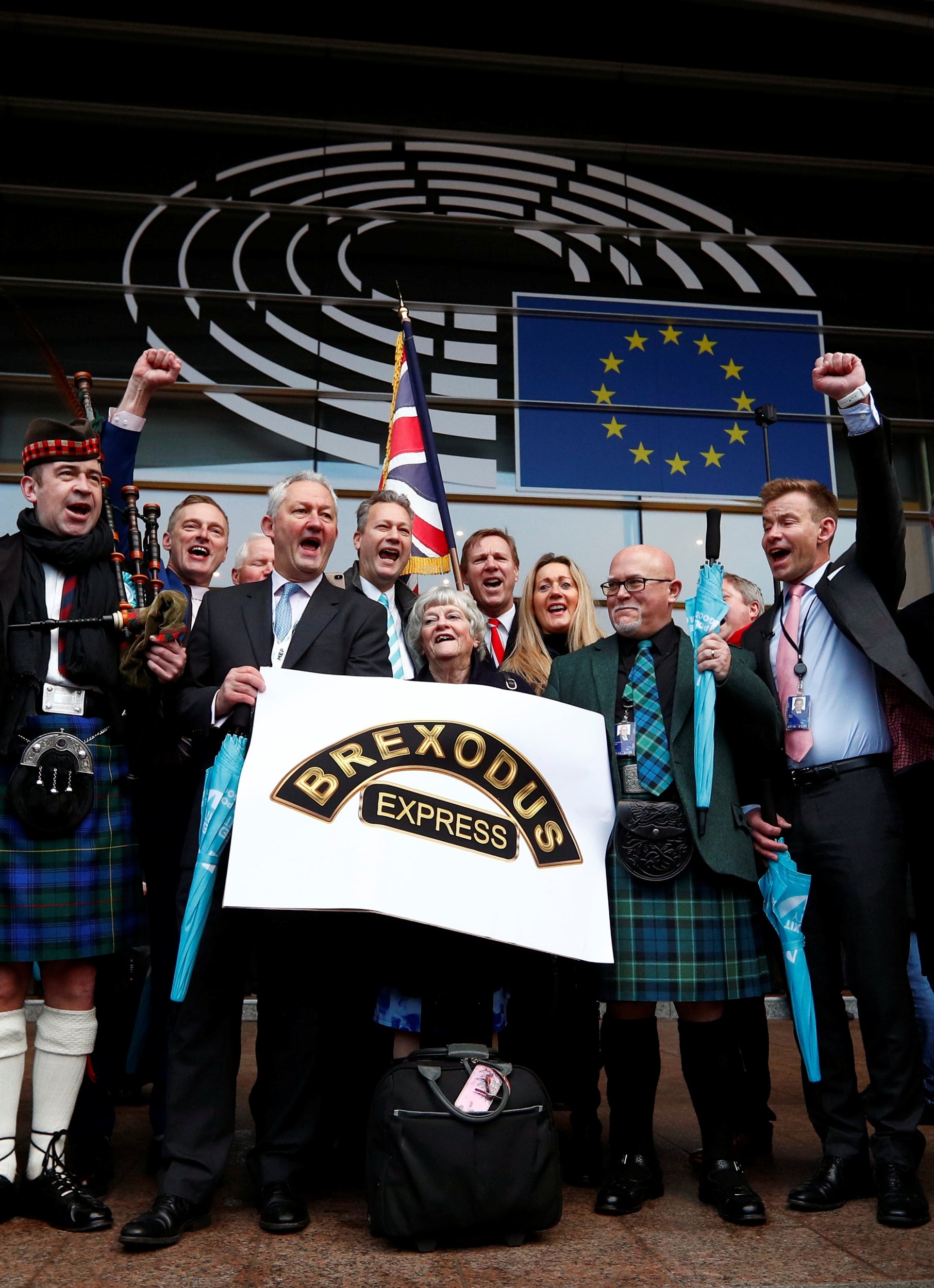
65/66
British pro-brexit Members of the European Parliament leave the EU Parliament for the last time
Reuters
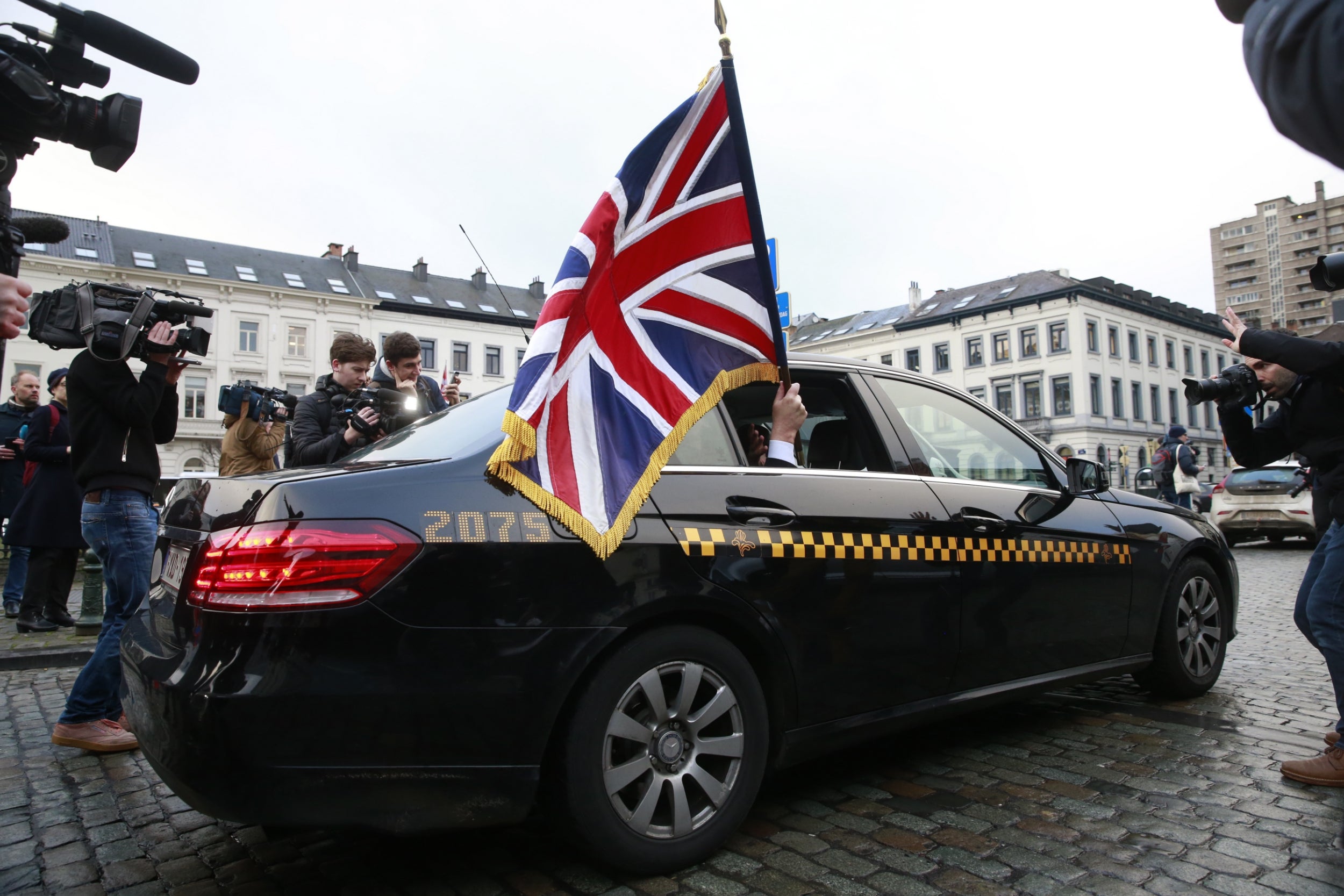
66/66
Jonathan Bullock waves the Union Jack as he leaves the European Parliament
EPA

1/66
A message projected onto the White Cliffs of Dover
Sky News/AFP via Getty

2/66
Getty

3/66
Big Ben, shows the hands at eleven o’clock at night
AFP via Getty Images

4/66
Nigel Farage speaks to pro-Brexit supporters
PA

5/66
Pro-Brexit demonstrators celebrate on Parliament Square
REUTERS

6/66
The Union flag is taken down outside the European Parliament in Brussels
PA

7/66
Pro-EU campaigners outside the Scottish Parliament, Edinburgh
PA

8/66
A pro-Brexit supporter jumps on an EU flag in Parliament Square
PA

9/66
EU Council staff removed the Union Jack-British flag from the European Council in Brussels, Belgium
EPA

10/66
A pro-Brexit supporter pours beer onto an EU flag
PA

11/66
Pedestrians pass in front of the Ministry of Defence Building on Whitehall, illuminated by red, white and blue lights in central London
AFP via Getty Images

12/66
A Brexit supporter shouts during a rally in London
AP

13/66
Pro-EU campaigners outside the Scottish Parliament, Edinburgh
PA

14/66
Pro-EU campaigners take part in a ‘Missing EU Already’ rally outside the Scottish Parliament, Edinburgh
PA

15/66
A large pro-EU banner is projected onto Ramsgate cliff in Kent
PA

16/66
Pro-EU supporters light candles in Smith Square in Westminster
PA

17/66
A man waves Union flags from a small car as he drives past Brexit supporters gathering in Parliament Square
AFP via Getty Images

18/66
The five-year old Elisa Saemann, left, and her seven-year old sister Katie hold a placard during a rally by anti-Brexit protesters outside the Scottish parliament in Edinburgh
AP

19/66
Pro Europe supporters gather on Brexit day near the British embassy in Berlin, Germany
EPA

20/66
Anti-Brexit protester hugs a man while holding a placard
REUTERS

21/66
A decorated, old fashioned fire pump in Parliament Square
PA

22/66
Pro Brexit Elvis impersonator performs at Parliament Square
Getty Images

23/66
An anti-Brexiteers stands with his dog in Parliament Square
AFP via Getty Images

24/66
Paddy from Bournemouth wears Union colours as he sits next to an EU flag decorated bag in Parliament Square
AFP via Getty Images

25/66
A pro-EU activist plays a guitar decorated with the EU flag during a protest organised by civil rights group New Europeans outside Europe House, central London
AFP via Getty Images

26/66
People celebrate Britain leaving the EU
REUTERS

27/66
A Pro Brexit supporter has a Union Jack painted onto his face at Parliament Square
Getty Images

28/66
Men hold placards celebrating Britain leaving the EU
REUTERS

29/66
Pro Brexit supporters dance in the street draped with Union Jack flags at Parliament Square
Getty Images

30/66
An anti-Brexit demonstrator spreads his wings during a gathering near Downing Street
AP

31/66
Pro EU supporters display a banner ‘ Here to Stay, Here to Fight, Migrants In, Tories Out’ from Westminster bridge
EPA

32/66
Pro-Brexit supporters burn European Union flags at Parliament Square
Getty

33/66
A man poses for a picture on Parliament Square in a ‘Brexit Day’ t-shirt
Reuters

34/66
People celebrate Britain leaving the EU
Reuters

35/66
AFP via Getty

36/66
A man wears a pro-Brexit t-shirt
Reuters

37/66
Anti-Brexit demonstrators visit Europe House to give flowers to the staff on Brexit day
Reuters

38/66
Pro Brexit supporter wears a novelty Union Jack top hat outside the Houses of Parliament
Getty Images

39/66
Customers Scott Jones and Laura Jones at the Sawmill Bar in South Elmsall, Yorkshire, where a Brexit party is being held throughout the day
PA

40/66
AP

41/66
Getty

42/66
Getty Images

43/66
Pro-EU activists protest
Getty Images

44/66
A pro-Brexit demonstrator burns a European Union flag
AP

45/66
Pro Brexit supporters
Getty Images

46/66
Pro Brexit supporters
Getty Images

47/66
A Brexit supports holds a sign in Parliament Square
AP

48/66
A man carries an EU themed wreath
Reuters

49/66
Ann Widdecombe reacts with other members of the Brexit party as they leave en masse from the European Parliament
PA

50/66
Anti-Brexit demonstrators in Parliament Square
PA

51/66
Pro EU supporters let off flares from Westminster Bridge
Getty

52/66
British MEPs Jonathan Bullock, holding the Union Jack flag and Jake Pugh leave the European Parliament, in Brussels on the Brexit day
AFP via Getty

53/66
Newspapers and other souvenirs at a store, near Parliament Square
Reuters

54/66
Brexit supporters hold signs in Parliament Square
AP

55/66
Pro-EU protesters hold placards in Parliament Square
AFP via Getty

56/66
French newspapers
PA

57/66
Sinn Fein leader Mary Lou McDonald with a Border Communities Against Brexit poster before its unveiling in Carrickcarnon on the Irish border
PA

58/66
National growers organisation British Apples & Pears has renamed a British apple to EOS, the Greek goddess of dawn, to commemorate Brexit day
AP

59/66
Pro-EU protesters hold placards in Parliament Square
AFP via Getty

60/66
Britain’s departure from the European Union was set in law on January 29, amid emotional scenes, as the bloc’s parliament voted to ratify the divorce papers. After half a century of membership and three years of tense withdrawal talks, the UK will leave the EU at midnight Brussels time (23.00 GMT) on January 31
Reuters

61/66
A man poses with paintings on Parliament Square
Reuters

62/66
People sporting Union Flags gather in Parliament Square
Getty

63/66
A man walks with a St. George’s flag at Westminster bridge on Brexit day
Reuters

64/66
A British bulldog toy and other souvenirs at a souvenir store
Reuters

65/66
British pro-brexit Members of the European Parliament leave the EU Parliament for the last time
Reuters

66/66
Jonathan Bullock waves the Union Jack as he leaves the European Parliament
EPA
The prime minister’s formal confirmation last week that the UK will not request an extension to talks with Brussels has heightened the pressure to achieve a swift agreement or face the prospect of new tariffs and other barriers to trade with the EU from 31 December.
Speaking as talks got under way, Mr Johnson’s official spokesman said that the PM would make clear that while the UK still wants to strike an “ambitious” free trade agreement (FTA) with the remaining EU, it is ready to move to World Trade Organisation rules from January 1 if a deal cannot be reached.
These would impose heavy tariffs on a number of imports, including a 10 per cent levy on motor vehicles coming from the EU, which is likely to push up the cost of standard family cars like Volkswagens and Renaults by £1,500 or more for British consumers.
Meanwhile, French former Europe minister Nathalie Loiseau, now a senior MEP for Mr Macron’s En Marche party, told Radio 4’s Today: “We are ready either for an agreement or for a no-deal. And we are getting prepared more actively to a no-deal considering the circumstances.
“We are waiting for Boris Johnson to get committed into the negotiations and to tell us if he really wants an agreement. So far there has been statements and positions repeated, but not something that looks like a real negotiation.”
The latest news on Brexit, politics and beyond direct to your inbox
The PM’s spokesman said Mr Johnson was urging “renewed energy and commitment to reach an agreement by the end of the summer”.
“The high-level meeting was always envisaged as a moment to push the negotiations forward,” he said.
“We now need to get this resolved and deliver certainty for businesses at home and in the EU as soon as possible.”
In a statement issued on Twitter shortly after today’s talks, Ms von der Leyen said that she, European Council president Charles Michel and European Parliament president David Sassoli had “noted the UK’s decision not to extend the transition period and agreed to deliver the best deal for our citizens”.
The EU had made clear that an extension of up to two years was available, and opinion polls suggested that the UK public wanted Mr Johnson to take advantage of the additional time because of the disruption to negotiations resulting from the coronavirus outbreak.
In a joint statement, Mr Johnson and Ms von der Leyen said that they “welcomed the constructive discussions” undertaken over the past four months by chief negotiators David Frost and Michel Barnier, which they said had allowed both sides to “clarify and further understand positions”.
But they added: “The parties agreed nevertheless that new momentum was required. They supported the plans agreed by chief negotiators to intensify the talks in July and to create the most conducive conditions for concluding and ratifying a deal before the end of 2020.
“This should include, if possible, finding an early understanding on the principles underlying any agreement.”
SNP Westminster leader Ian Blackford said that Scottish Government analysis found that ending the transition period in 2020 could remove £3 billion from the Scottish economy in just two years – on top of the impact of coronavirus.
“Boris Johnson is taking the UK head-first towards a Brexit disaster – threatening our economy with the growing risk of a devastating bad deal or no-deal outcome,” said Mr Blackford.
“Yet again, the Prime Minister is putting the narrow Tory Brexit obsession ahead of his responsibilities to protect people’s jobs, businesses and living standards. He must think again, pause his failed talks and agree to the two-year transition period extension on offer.
“The UK already faces the worst economic crisis in decades. It would be reckless in the extreme for the Tory government to pile a Brexit crisis on top of coronavirus, which would put even more jobs and businesses at risk and cause unemployment to soar.”


